#i saw it today! as critical as i am of disney as a company i do really love their animated movies
Explore tagged Tumblr posts
Text
i want to say the wildest thing about wish is that disney fully funded and released a movie where the bad guy could basically be a metaphor for the disney company. but it's even wilder because they funded and released it as their celebratory 'we're 100 years old and we're soooo great' movie. and what's even wilder than that is that their 'we're 100 years old and we're so great movie', which features a bad guy who is basically a metaphor for their company, was a flop
#i saw it today! as critical as i am of disney as a company i do really love their animated movies#HOWEVER#I was dubious going into this bc it was so universally hated but like..... its really not that bad?#its not amazing either. like its no tangled or beauty and the beast or anything.#but ppl r out here saying its disney worst movie like theyve never seen home on the range or chicken little.#also lots of ppl doing very poor analysis of a film that is really not that deep or layered tbqh#also lots of ppl being just straight up racist! you can critique a movie and its main character without being racist. it IS possible u know#anyway im rambling but this whole thing is just so funny to me#also ftr though im not sure the movie itself deserves all the hate its gotten i do think it is time for disney to fall from grace#im sorry it happened with a movie that doesnt totally deserve it but if their 100 year celebration movie being panned#doesnt force them to make good movies again then nothing will. 🤷🏼#i also wouldnt cry if they died as a company but i think thats really unlikely.#so if theyre going to keep existing the least they can do is make good movies.
8 notes
·
View notes
Text

If You Have No Imagination, You Can’t
Imagine
Stephen Jay Morris
3/15/2024
©Scientific Morality
The late John Lennon was one of many voices of a generation, though many of those voices didn’t want the job. I think I wrote about this song some time ago. Well, recently, I saw a video posted by a Catholic bishop, denouncing the song, “Imagine,” by John Lennon. The name of the video is, “Why I hate the song, Imagine.” Hate, you say? Now that is a pretty strong word for a bishop of the Church. He initially gave faint praise to John Lennon and then proceeded to criticize the song, reciting it line by line, and explaining how each one was inspiring a rebellion of God, which is a sin. He declared the song a “secular anthem.”
Okay, Boomer! But it’s not. What it is, is a wishful fantasy about the uniting of humanity. Can you imagine if he had written a line like, “Imagine no priests molesting little boys?” In that case, the bishop would have a reason to complain.
John Lennon was the voice of a generation whether he wanted to be or not. This issue is similar to the Taylor Swift controversy today. In the early 70’s, the government, oil companies, and protestant churches were shitting bricks over John Lennon. So, like MLK, they spied on him and tried to extradite him from the USA.
I remember the hatred and anger that spewed over this song in 1971. I was listening to a Top 40’s station when—I forget who the disk-jockey was—after playing the song, the guy went on a tirade about how John was a hypocrite because he was rich. It seems American conservatives have this misconception that, if you have leftist views, you must take a vow of poverty. Wrong! I’d rather be among rich communists that piss poor conservatives. So, am I to believe that if you are a conservative, you must be rich, otherwise you can’t be one? The anfractuous folly of the political right is endless.
The song is a soft, wistful ballad that seems to have been written from a spiritual state of mind. Lyrically, it is suggesting the listener consider the propositions; ruminate over them. This type of fancible idealism started in the late 50’s to the mid 60’s. The pacifist movement merged with the folk music era. Afterward came the Flower Children with their visions of world peace, and then the New Age movement in the 70’s. Lennon wanted to captivate the Boomer generation with this ballad, and he did.
Conservatives are afraid of artistic influence over the younger generations, for they are proponents of masculinity. Anything sensitive targets their accusations of inofficiousness to the Christian state. Femininity is evil and masculinity is godly.
John Lennon offered a great and novel proposition when he wrote:
Imagine there's no heaven.
It's easy if you try.
No hell below us
Above us only sky.
Imagine all the people living for today!
A well-said proposition. Most adherents to the three main religions look forward to death. They feel the earth is Satan’s property and that Heaven will be like Disney World. Suckers! Why not live for now?
Now for the political portion of the piece:
Imagine there's no countries.
It isn't hard to do.
Nothing to kill or die for
And no religion, too.
Imagine all the people living life in peace.
Yeah, the conservatives are always preaching about small government. And yet if you say “do away with it” they lose their lunch. Good introduction for newbies to anarchism.
Now the line that pissed off conservatives:
Imagine no possessions.
I wonder if you can?
No need for greed or hunger.
A brotherhood of man.
Imagine all the people sharing all the world.
You may say I'm a dreamer.
But I'm not the only one.
I hope someday you’ll join us,
And the world will be as one.
Oh, gee! How fucking blasphemous!
So, in my confabulatory take of the religious shit, there are no such things as good and evil. God floods the earth and Satan talks about world peace. Forget about it!
This song is fantastic and if you don’t like it, fuck you! And fuck your material property’ too!
#stephenjaymorris#american politics#youtube#anarchism#poets on tumblr#baby boomers#anarchopunk#anarchocommunism#john lennon#right wing#the beatles
0 notes
Photo

Made a little collage of things that had inspired and basically formed many of my characteristics to make me who I am.
Top row: Power Ranger (I had always loved this show since not only was and sometimes still is the coolest but could cover some critical moments in one’s life; this taught me many things and also kicked off a love for martial arts), Swoozie (a YouTuber that makes hilarious story times and in some made a main take away in order to help others in the same situation; this sorta rubbed off onto me to help others in similar situations), Markiplier (a lets play YouTuber who makes people laugh a lot and even does so much for others that it makes others smile all the time; this is something that I also love to do), Nintendo (Everyone pretty much knows them but the games they make has always been unique and something to make people happy; I love their games and they really inspire some creativity), & Cartoon Network (Though now there isn’t too many shows the shows that were once there were unique and very much had a huge impact on kids; I learned too many things from shows on this network and had many laughs).
Middle Row: Marvel (Everyone pretty much knows them but the fact that the comics that are generated from them can cover real events in a fantasy setting has made many people look in awe; I loved the heroes and some villains and just how they seem more human then others) & Bones (an anime production company that has made most anime that I watched through my adolescence and even to this day; Inspired creativity for many ideas).
Bottom Row: Nickelodeon (just like cartoon network always had many shows that had put the smile on many kids; also gave in joy and many lessons on life), Stan Lee (Without him many of what people know about Marvel would not exist; his creativity towards creating things and just overall love for the craft he made had always inspired me), Toei Animation (an anime company that has made many anime that people probably saw without knowing it was an anime such as Dragon Ball Z; their works I grew up on and I still watch today and had many inspirations from their projects, especially one specific one that is inspiring something I’m working on), Final Fantasy (a game series made by Square Enix which had many interesting stories and characters; for me Final Fantasy 7 had given me so much feelings while playing and has helped to make an inspiration for another thing I’m working on), A1 pictures (another anime company that had worked on anime such as Fairy Tail had worked on many projects; some of their work had given me many joy and chills in some shows), & PBS Kids (many shows that are given to kids and showed how kids can learn many things in life; for me it had taught me many things and has especially encouraged me to be curious of things).
Honorable Mention: Disney (Everyone knows this company and gives many joy to people of all ages in many forms; Helped with many creativity ideas and to give many life lessons especially today).
2 notes
·
View notes
Text
Whenever I visit Olvera Street, as I did a couple of weeks ago, my walk through the historic corridor is always the same.
Start at the plaza. Pass the stand where out-of-towners and politicians have donned sombreros and serapes for photos ever since the city turned this area into a tourist trap in 1930.
Look at the vendor stalls. Wonder if I need a new guayabera. Gobble up two beef taquitos bathed in avocado salsa at Cielito Lindo. Then return to my car and go home.
I’ve done this walk as a kid, and as an adult. For food crawls and quick lunches. With grad students on field trips, and with the late Anthony Bourdain for an episode of his “Parts Unknown.”
This last visit was different, though: I had my own camera crew with me.
My last chance at Hollywood fame was going to live or die on Olvera Street.
I was shooting a sizzle reel — footage that a producer will turn into a clip for television executives to determine whether I’m worthy of a show. In this case, I want to turn my 2012 book “Taco USA: How Mexican Food Conquered America” into the next “Diners, Drive-Ins, and Dives.” Or “Somebody Feed Phil.” Or an Alton Brown ripoff. Or a TikTok series.
Anything at this point, really.
For more than a decade, I’ve tried to break into Hollywood with some success — but the experience has left me cynical. Personal experience and the historical record have taught me that studios and streamers still want Mexicans to stay in the same cinematic lane that American film has paved for more than a century. We’re forever labeled… something. Exotic. Dangerous. Weighed down with problems. Never fully developed, autonomous humans. Always “Mexican.”
Even if we’re natives of Southern California. Especially if we’re natives of Southern California.
I hope my sizzle reel will lead to something different. I doubt it will because the issue is systemic. Industry executives, producers, directors and scriptwriters can only portray the Mexicans they know — and in a perverse, self-fulfilling prophecy, they mostly only know the Mexicans their industry depicts even in a region where Latinos make up nearly half the population.
The vicious cycle even infects creators like me.
As the film crew and I left for our next location, I stopped and looked around. We were right where I began, except I now looked south on Main Street. The plaza was to my left. City Hall loomed on the horizon. The vista was the same as the opening scene of “Bordertown,” a 1935 Warner Bros. film I had seen the night before. It was the first Hollywood movie to address modern-day Mexican Americans in Los Angeles.
What I saw was more than déjà vu. It was a reminder that 86 years later, Hollywood’s Mexican problem hasn’t really progressed at all.
Birth of a stereotype
Screen misrepresentation of Mexicans isn’t just a longstanding wrong; it’s an original sin. And it has an unsurprising Adam: D.W. Griffith.
He’s most infamous for reawakening the Ku Klux Klan with his 1915 epic “The Birth of a Nation.” Far less examined is how Griffith’s earliest works also helped give American filmmakers a language with which to typecast Mexicans.
Two of his first six films were so-called “greaser” movies, one-reelers where Mexican Americans were racialized as inherently criminal and played by white people. His 1908 effort “The Greaser’s Gauntlet” is the earliest film to use the slur in its title. Griffith filmed at least eight greaser movies on the East Coast before heading to Southern California in early 1910 for better weather.
The new setting allowed Griffith to double down on his Mexican obsession. He used the San Gabriel and San Juan Capistrano missions as backdrops for melodramas embossed with the Spanish Fantasy Heritage, the white California myth that romanticized the state’s Mexican past even as it discriminated against the Mexicans of the present.
In films such as his 1910 shorts “The Thread of Destiny,” “In Old California” (the first movie shot in what would become Hollywood) and “The Two Brothers,” Griffith codified cinematic Mexican characters and themes that persist. The reprobate father. The saintly mother. The wayward son. The idea that Mexicans are forever doomed because they’re, well, Mexicans.
Griffith based his plots not on how modern-day Mexicans actually lived, but rather on how white people thought they did.
A riot nearly broke out as Latinos felt the scene mocked them. It was perhaps the earliest Latino protest against negative depictions of them on the big screen.
But the threat of angry Mexicans didn’t kill greaser movies. Griffith showed the box-office potential of the genre, and many American cinematic pioneers dabbled in them. Thomas Edison’s company shot some, as did its biggest rival, Vitagraph Studios. So did Mutual Film, an early home for Charlie Chaplin. Horror legend Lon Chaney played a greaser. The first western star, Broncho Billy Anderson, made a career out of besting them.
These films were so noxious that the Mexican government in 1922 banned studios that produced them from the country until they “retired... denigrating films from worldwide circulation,” according to a letter that Mexican President Álvaro Obregón wrote to his Secretariat of External Relations. The gambit worked: the greaser films ended. Screenwriters instead reimagined Mexicans as Latin lovers, Mexican spitfires, buffoons, peons, mere bandits and other negative stereotypes.
That’s why “Bordertown” surprised me when I finally saw it. The Warner Bros. movie, starring Paul Muni as an Eastside lawyer named Johnny Ramirez and Bette Davis as the temptress whom he spurns, was popular when released. Today, it’s almost impossible to see outside of a hard-to-find DVD and an occasional Muni marathon on Turner Classic Movies.
Based on a novel of the same name; Muni was a non-Mexican playing a Mexican. Johnny Ramirez had a fiery temper, a bad accent and repeatedly called his mother (played by Spanish actress Soledad Jiminez ) “mamacita,” who in turn calls him “Juanito.” The infamous, incredulous ending has Ramirez suddenly realizing the vacuity of his fast, fun life and returning to the Eastside “back where I belong ... with my own people.” And the film’s poster features a bug-eyed, sombrero-wearing Muni pawing a fetching Davis, even though Ramirez never made a move on Davis’ character or wore a sombrero.
These and other faux pas (like Ramirez’s friends singing “La Cucaracha” at a party) distract from a movie that didn’t try to mask the discrimination Mexicans faced in 1930s Los Angeles. Ramirez can’t find justice for his neighbor, who lost his produce truck after a drunk socialite on her way back from dinner at Las Golondrinas on Olvera Street smashed into it. That very socialite, whom Ramirez goes on to date (don’t ask), repeatedly calls him “Savage” as a term of endearment. When Ramirez tires of American bigotry and announces he’s moving south of the border to run a casino, a priest in brownface asks him to remain.
“For what?” Ramirez replies. “So those white little mugs who call themselves gentlemen and aristocrats can make a fool out of me?”
“Bordertown” sprung up from Warner Bros.’ Depression-era roster of social-problem films that served as a rough-edged alternative to the escapism offered by MGM, Disney and Paramount. But its makers committed the same error Griffith did: They fell back on tropes instead of talking to Mexicans right in front of them who might offer a better tale.
Just take the first shot of “Bordertown,” the one I inadvertently recreated on my television shoot.
Under a title that reads “Los Angeles … the Mexican Quarter,” viewers see Olvera Street’s plaza emptier than it should be. That’s because just four years earlier, immigration officials rounded up hundreds of individuals at that very spot. The move was part of a repatriation effort by the American government that saw them boot about a million Mexicans — citizens and not — from the United States during the 1930s.
Following that opening shot is a brief glimpse of a theater marquee that advertises a Mexican music trio called Los Madrugadores (“The Early Risers”). They were the most popular Spanish-language group in Southern California at the time, singing traditional corridos but also ballads about the struggles Mexicans faced in the United States. Lead singer Pedro J. González hosted a popular AM radio morning show heard as far away as Texas that mixed music and denunciations against racism.
By the time “Bordertown” was released in 1935, Gonzalez was in San Quentin, jailed by a false accusation of statutory rape pursued by an L.A. district attorney’s office happy to lock up a critic. He was freed in 1940 after the alleged victim recanted her confession, then summarily deported to Tijuana, where Gonzalez continued his career before returning to California in the 1970s.
Doesn’t Gonzalez and his times make a better movie than “Bordertown”? Warner Bros. could have offered a bold corrective to the image of Mexican Americans if they had just paid attention to their own footage! Instead, Gonzalez’s saga wouldn’t be told on film until a 1984 documentary and 1988 drama.
Both were shot in San Diego. Both received only limited screenings at theaters across the American Southwest and an airing on PBS before going on video. No streamer carries it.
How Hollywood imagines Mexicans versus how we really are turned real for me in 2013, when I became a consulting producer for a Fox cartoon about life on the U.S.-Mexico border.
The title? “Bordertown.”
It aired in 2015 and lasted one season. I enjoyed the end product. I even got to write an episode, which just so happened to be the series finale.
The gig was a dream long deferred. My bachelor’s degree from Chapman University was in film. I had visions of becoming the brown Tarantino or a Mexican Truffaut before journalism got in the way. Over the years, there was Hollywood interest in articles or columns I wrote but never anything that required I do more than a couple of meetings — or scripts by white screenwriters that went nowhere.
But “Bordertown” opened up more doors for me and inspired me to give Hollywood a go.
While I worked on the cartoon, I got another consulting producer credit on a Fusion special for comedian Al Madrigal and sold a script to ABC that same year about gentrification in Boyle Heights through the eyes of a restaurant years before the subject became a trend. Pitch meetings piled up with so much frequency that my childhood friends coined a nickname for me: Hollywood Gus.
My run wouldn’t last long. The microagressions became too annoying.
The veteran writers on “Bordertown” rolled their eyes any time I said that one of their jokes was clichéd, like the one about how eating beans gave our characters flatulent superpowers or the one about a donkey show in Tijuana. Or when they initially rejected a joke about menudo, saying no one knew what the soup was, and they weren’t happy when another Latino writer and I pointed out that you’re pretty clueless if you’ve lived in Southern California for a while and don’t know what menudo is.
The writers were so petty, in fact, that they snuck a line into the animated “Bordertown” where the main character said, “There’s nothing worse than a Mexican with glasses” — which is now my public email to forever remind me of how clueless Hollywood is.
The insults didn’t bother me so much as the insight I gained from those interactions: The only Latinos most Hollywood types know are the janitors and security guards at the studio, and nannies and gardeners at their homes. The few Latinos in the industry I met had assimilated into this worldview as well.
Could I blame them for their ignorance when it came to capturing Mexican American stories, especially those in Southern California? Of course I can.
What ended any aspirations for a full-time Hollywood career was a meeting with a television executive shortly after ABC passed on my Boyle Heights script (characters weren’t believable, per the rejection). They repeatedly asked that I think about doing a show about my father’s life, which didn’t interest me. Comedies about immigrant parents are clichéd at this point. So one day I blurted that I was more interested in telling my stories.
I never heard from the executive again.
A pair of boots
Five years later, and that Hollywood dream just won’t leave me.
I’m not leaving journalism. But at this point, I just want to prove to myself that I can help exorcise D.W. Griffith’s anti-Mexican demons from Hollywood once and for all. That I can show the Netflix honcho they were wrong for passing on a “Taco USA” series with the excuse that the topic of Mexican food in the United States was too “limited.” And the Food Network people who said they just couldn’t see a show about the subject as being as “fun” as it was. Or the bigtime Latino actor’s production company who wanted the rights to my "¡Ask a Mexican!” book, then ghosted me after I said I didn’t hold them but I did own the rights to my brain.
When this food-show sizzle reel gets cut, and I start my Hollywood jarabe anew, I’ll keep in mind a line in “Bordertown” that Johnny Ramirez said: “An American man can lift himself up by his bootstraps. All he needs is strength and a pair of boots.”
Mexicans have had the strength since forever in this town. But can Hollywood finally give us the botas?
#mexican#mexican american#chicano#chicana#usa#united states#racism#discrimination#hollywood#movies#history#california#stereotypes#latinos#latinas#ku klux klan#mexico#🇲🇽
3 notes
·
View notes
Note
I keep on seeing so many people saying things like "Down with Disney, they're contributing to capitalism" and honestly, as a socialist myself, I just want to enjoy my wholesome movies.
I think I’m on the Down with Disney side tbh! I was raised on many a Disney movie, and the princesses played an enormous part in sparking my love of fantasy and badass girls. However, they also played a HUGE part in the way I saw myself as a black girl growing up, and I definitely think they need to be held accountable for the way they are monopolizing the entire entertainment industry. For at least the duration of my life, and probably decades more, Disney has been responsible for a lot of the cultural narrative (especially in the States) and socializing children into white cis/het norms. People have made documentaries and papers on the effect of Disney and its gargantuan influence on the world. So for that reason, I can’t just call their movies wholesome, as much as Disney likes to pretend they are. Though I wouldn’t be the same person I am today without Mulan, Ariel, Simba, and such, I firmly believe that the media we love can always be improved.
I did my high school senior econ project on the Disney company, and let’s just say Walt & co may literally be the most successful capitalists of all time. We should all be very concerned by and critical of the fact that they own most of the major IP and networks in Hollywood (Pixar, Marvel, Star Wars, ESPN, Dreamworks, ABC/Freeform and wayyyyy more) and they’re wringing pennies out of us with all their different services and merch and blockbusters. They hide behind the friendly facade of Mickey Mouse and other nostalgic figures to rebrand themselves over and over again and to obscure their major control over entertainment. They’ve also been weaponizing the media diversity movement by sprinkling crumbs of representation into their shows and films (while still doing stuff like brownface and queerbaiting) to make money off of marginalized communities. I’m so down to watch girls do magic and sing songs in their little hour and a half journeys, but as long as we do so critically and make sure we don’t fall into Disney’s trap. They want you to see them as this innocent kid-friendly company, they want you to forget the harm they do, they want you to forget their immense sphere of influence that will keep them in business forever and keep you paying them like 10x the amount they need, but don’t fall for it. They know exactly what they’re doing and they should be held accountable.
17 notes
·
View notes
Text
Why do people criticize Jojo Rabbit?
We'd say that this is uncharted territory for distributor Disney, but the company did previously give us their futures face. Hmm. I saw Jojo Rabbit in the best place I could for movies, in my opinion.
For this list, we're looking at why Tyco ITTS 2019 black comedy has proven. So polarizing for critics just to clarify the critical reception thus far has been mostly positive and even watch mojo gave the film a rave review following its TIFF premiere.
Nevertheless, we can definitely see why a movie like this. Wouldn't win audiences over everywhere. Hey Joe, Joe, my old friend. Hi adults. Number 10, the controversial premise. I don't think I can do this last. Of course you can simply by reading it synopsis, you can tell why Jojo rabbit has stirred up so much controversy.
In the midst of world war II, a young German boy named Joe Joe dreams of becoming a Nazi upon learning that his mother has been harboring a Jewish girl in the attic though, Jo Jo begins to reevaluate his outlook on life. I tell them you will be in big trouble throughout this coming of age journey. Our titular character is guided by his imaginary friend.
youtube
Is it worth to watch Jojo Rabbit full movie
Who just so happens to be a flamboyantly incompetent, Adolf Hitler, as inventive as the premises, it was guaranteed to ignite passionate feelings. Critics are unsurprisingly split as to whether the film's premise is inspired or irresponsible. I wish more of our young boys had your blind fanaticism. Okay.
Number nine, how it stacks up to other satires and this world is ruined for everyone and the good earth is rich and can provide for everyone. The way of life can be free and beautiful, but we have lost the way Jojo rabbit. Isn't the first film to satirize Hitler or Nazis 1940 twos to be, or not to be was criticized upon release for its farcical, spin of Nazi occupied Poland.
But today is viewed as a comedy classic. I know you're quite famous in London kernel. They call you concentration camp Earhart. Yes. Yes, we do the concentrating and the poles do the camping Hitler. Technically isn't the protagonist and the great dictator. It's obvious who Charlie Chaplin was parodying. We can learn more about actress playing mother Jojo on Wikipedia.
Arguably the most famous sendup of Nazi Germany is Mel Brooks. The producers. In which two con men put on an intentionally horrible musical entitled springtime for Hitler. Practically a love letter to this own run a week week. Are you kidding display? It's got the close on page four. Some critics are ready to place Jojo rabbit alongside these revolutionary respected comedy.
What do critics write in reviews about Jojo Rabbit?
Others, however, would claim that the film has more in common with the bridge sit-com Hile, honey I'm home, which was so misguided and tasteless that it only lasted one episode. Oh 10 night. You will make an schnitzel. What a joke. You must be real mad at me, honey. I'm a very, very bad Hitler. Number eight, what's going on in the real world right now?
Fuck man. The house, although world war II is in the past. The same, unfortunately can not be said about bigotry. Nowhere was this more apparent than at the 2017 unite the right rally in Charlottesville, which attracted several hate groups, including neo-Nazis. Since prejudice and discrimination remain prevalent in today's world.
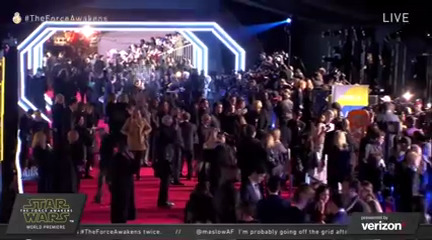
It's obvious why various critics would object to a film that makes light of Nazi Germany. Nevertheless, satire can reflect modern times as well as history in ways that straightforward drama can't. Some might argue that now isn't the right time for a Nazi satire, but others would debate that society needs a movie like Jojo rabbit. A great story about the Irishman is here.
Now more than ever, you're not to nuts. Jojo, tenue kids likes dressing up in front of you. If somebody wants to be part of a club. Number seven, the humor, the best weekend ever.
Soundtrack in the highest level of production
Wow. Your enjoyment of Jojo rabbit will hinder on how hard you laugh. Or of course, if you laugh, the film didn't tickle. Roger Freedman. Funnybone who wrote in his showbiz four one, one review Jojo rabbit is actually borderline antisemitic offensive on many levels and not even funny. Sam Adams of slate couldn't have disagreed more proclaiming for Jojo rabbit comedy.
Isn't a means to minimize, but to analyze wise, to pry at the way, hateful ideologies can be embraced as a comfort and how beneath their promise to. Blame how the world really works is an understanding no more sophisticated than a child's it's time to buy some books. Since humor is subjective, we guess there isn't always going to be a clear line between what's offensively funny and what's just plain offensive.
Oh God. Number six. Jewish jokes. Did you know, Jews can Z to each other's mind. So tell us, you know, who saw one? They could look just like us of Tyco. ITT satire is clearly the Nazis. However, the director who's of Jewish and Maori heritage also pokes fun at Judaism. Hi, well, the real Jordan Rumi was horrified by the audience's reception at the screening he attended.
Writing, you have no idea how it is to be surrounded by thousands of people laughing at jokes, specifically directed at Jews. That being said, Rumi seemed to be in the minority of a group that found the film. Hilarious. As with Borat and South park, many would argue that the humor and Jojo rabbit isn't intended to mock the Jewish faith, but to criticize how ignorant and Semites are a cute number five, the life is beautiful comparison, right?
Jojo Rabbit's reaction to mom's death
Yeah. Critics have stocked a Jojo rabbit up against numerous other films. But life is beautiful. Seems to be the one that's invited the most comparisons this 1997, Italian dromedy also presented world war II through a lighthearted lens, centering on a Jewish man who uses humor and imagination to shield his son from the horrors of the Holocaust. It's interesting what they write about this movie on Amazon.
Well, the film won an Academy award for best foreign language film, and even got nominated for best picture. There were those who found the movies comedic tone, inappropriate. Over two decades later, we will continue to debate if the movie is a life affirming fable or a dated misfire. It's actually eerie how much these two films have in common, especially since both one TIFs peoples choice award.

That is the strongest thing in the world. Number four, is it shocking enough? I was your age. I had an imaginary friend come in so much stuff even before the first trailer dropped Jojo rabbit was being built up as one of 20 nineteens most controversial movies. Weirdly enough though, some critics have expressed disappointment that the film isn't more shocking.
Well, audiences have arguably gotten more sensitive with time. There are still patrons who crave comedy that pushes the envelope to its limits. It's time to burn some books. Brian Talarico of the Chicago sun times felt Jojo rabbit played it too safe. Writing the final scenes of Jojo rabbit are too easy for a film that needs to be dangerous and daring.
Are the best scenes already included in the trailer?
Even if the film doesn't go all out with its edgy concept. Seeing Tyco, ITT dresses, Adolf Hitler will be more than enough to make a few jobs drop. What am I going to do? No idea. Going down the house in Glen Winston church one, negotiate number three. It's depiction of Nazis. The playlist Charles romesco took issue with the films, humanization of antisemites writing.
YTT concedes that a good percentage of Nazis really do hold hate in their heart. But maintains that at least some of them aren't you two seem to be getting on. Well, it doesn't seem like a bad cost. How much pain and suffering the Nazis caused many audiences will understandably struggle with this message.
However, if Ron Jones proved anything with his third wave social experiment in 1967, it's that even ordinary people can get swept up in the dangerous ideals of fascism. Likewise, Jojo rabbit poses, a challenging question. If we're not willing to acknowledge the bad and the good in people, how can we ever rid ourselves of prejudice?
Nothing makes sense anymore. Yeah, I know. It's definitely not a good time to be a Nazi. Number two it's message. And mother took me. She's kind me like a person, whatever your thoughts on Jojo rabbit, Tyco ITT clearly wanted to spread an anti hate message. YTT also claims that he started writing the screenplay before Nazis regained relevance in the media.
There's little doubt that why TTS intent was noble, whether or not the final product successfully gets his message across is where critics are split. A doubt of the a V club felt that making fun of Nazi Germany had been done before. Thus taking away from the movies, broader anti hate theme. Peter Howell begged to differ in his Toronto star review writing Taika YTT knocks it out of deer park with the meaningful lunacy of his anti hate satire, which is equal parts.
Adolf Hitler's thread in the movie
Mel Brooks, West Henderson, and own whimsical brilliance growing up too fast. Ten-year-olds and the celebrating war and talking politics. Before we continue, be sure to subscribe to our channel and ring the bell to get notified a better latest videos. You'll have the option to be notified for occasional videos or all of them.
If you're on your phone, make sure you go into your settings and switch on notifications. Number one it's depiction of Hitler. Well, they call me a scared rabbits. Okay. Let's address the giant rabbit in the room. Tyco YTT spends most of his screen time prancing around in a Nazi uniform and toothbrush mustache. If you want, you can read here about preparations for making a movie and other curiosities.
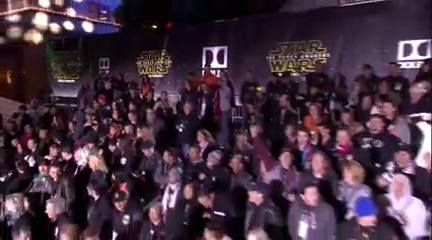
Without a doubt, YTT, didn't set out to deliver a serious or dignified portrayal of Hitler. Rather YTT aspired to make the fewer look as goofy and idiotic as possible. Oh, . Just painting Hitler as a wacky, even likable buffoon desensitized us to the atrocities. He committed though. Some may say yes while others may argue that it leaves audiences more informed and open-minded.
At the end of the day, everyone is going to have a different opinion of Jojo. Let them say whatever they want. People used to say a lot of nasty things about me. Oh, this guy's a lunatic. Oh, look at that psycho. He's going to get us all killed. Do you agree with our picks, check out this other recent clip from watch mojo and be sure to subscribe and ring the bell to be notified about our latest videos.
1 note
·
View note
Text
Gonna be honest now finally. I was even nervous or just didn’t feel like making this. But considering I’ve had revealed it and talked about it. I’ll go into more detail. Yet it’s also my thoughts on Disney.
My hatred towards on Disney really started because of Alex Hirsch choosing to end Gravity Falls. Despite it was his choice and I learned Disney wanted a third season. Including in the same year Wander Over Yonder was canceled. While in 2016 I was still liking Disney, but over time I stopped watching any Disney related by my own will, I started to despise the company. All because two shows I dearly loved ended.
While it built up over time with me not liking how Disney has been treating Star Wars, and how the MCU is going. Along with Disney becoming this huge juggernaut. Even though I did see some Disney related films. Yet I still had this hatred for the company.
Now I’m watching shows like Amphibia and Big City Greens on the Disney Channels, rarely Gravity Falls, and today well it’s 12:41 am now, I put the live action version of Beauty And The Beast because I enjoyed that film. But I went outside to be in the pool with family when it was in the middle half of the movie from what I saw.
Basically over time it built up for me to watch Disney related shows again because I guess in a way blame the company for two shows I loved ending. I joined the disliking of Disney because of this. Despite Disney had nothing to do with Gravity Falls ending.
While I’m still quite critical of how Disney is as a company. Other companies aren’t excused from that. Yet the main thing even if I don’t like Disney much, there are things I like.
It’s just Gravity Falls ending(I still haven’t watched the finale despite I know how it some what goes), and Wander Over Yonder ending changed me as a person. In some weird silly ways but other ways too. In a weird way I felt like I became a mess after all that but I think the best way to describe myself, I’m better these days.
Gravity Falls is done, it’s gone, WOY should have a third season but I don’t know if it’s possible. Including I even said on Twitter Big City Greens and Amphibia are the best Disney cartoons I’ve seen since Wander Over Yonder. I’ve learned to move on quite some aspects. Especially focusing on other stuff that makes me happy. 12:52 am
I just feel I should let that out. Hopefully this isn’t a huge thing with people. Sorry to bother people in the tags.
33 notes
·
View notes
Text
Hide and Seek
AO3 link.
Fandom: Sanders Sides
Relationships: Platonic everyone. But if you squint, you might see some Loceit and Remile.
Summary: Ever wonder how Virgil always wins in hide and seek? Well, wonder no more, for I have the answer right here!
Author’s note: This is inspired by an incorrect Sanders Sides quote I made on Twitter. That quote was inspired by me writing down cosplay ideas, Virgil and Patton playing hide and seek with each other and Virgil "cheating", finding Patton super quick ;)
This is basically just fluff and Virgil being a sneaky bean.
Hide and Seek
A knock sounded on his door. Virgil groaned. Why couldn’t he just sleep? It was only, what? 11 am?
“Hey, kiddo?” Patton. “Roman and I have arranged a day out in the Imagination. Are you even up?” he added after a moment of hesitation, sounding disapproving.
‘No, I’m not, but it’s not like I can say that to you’ Virgil thought to himself. “Yeah, I’m up. Just, uh, dosing of a bit. I’ll be down in a minute.”
“Yay!” Patton left. Ugh, what did they have planned this time? Horseback riding was bad enough; his rear still hurt a bit, by the way, Princey!
Virgil got out of bed and got dressed before he went to his bathroom to put on his make-up. What? He still liked to keep up his aesthetics even though they weren’t filming. Sure, they were going outside in the Imagination, and it would probably be ruined, but he still liked it, okay?!
It’d been about ten minutes since Patton had knocked on his door when he finally ventured downstairs to the commons. Patton was bouncing on his feet, keeping himself from jumping Virgil with a hug. Logan sat on the couch reading. Looked like he didn’t want to be there, either, but when faced with Patton, one can’t say no. He’ll only give you his puppy-dog-eyes, and you’ll be in a puddle on the floor.
Roman was sporting his outdoor clothes. He always did when they went into the Imagination. Didn’t want to ruin his prince outfit. He looked rather disgusted with something Remus had said before swatting his playfully on the arm. Same old.
What surprised Virgil was that Deceit was there. He usually didn’t want to partake in outdoor activities because of his reptilian traits. Roman and Patton must have made sure it was the perfect temperature. Dee was currently leaning up against Logan, eyes closed, basking in Logan’s body heat.
As Virgil came to a stop in front of Patton, he heard another door open and close. Virgil opened his arms to give Patton permission to hug him. And hug him he did!
“Alright, babes! Save some of him for me, would ya?” Virgil’s eyes widened. Patton invited Sleep as well? Or Remy, as the fanders had dubbed him. A name he now proudly wore.
Patton slowly released Virgil from the embrace. “Heya Remy! So happy you decided to come! Is Emile coming as well?” Wait, Patton invited Emile, too? Who else did he ask to join? Anton, the Critic? Antagonist? October?
“Yep! My boo will be down any moment now. Had to wrap up practising some lines for Thomas’ upcoming Cartoon Therapy episode. Now, as for you, Virgil,” Remy said, turning to look at Virgil. “You better stop pulling those long nights, mister! I am missing out on so many parties because you keep Thomas up all night with me trying to put him to sleep!” Remy exclaimed before pulling Virgil into a hug, this one lighter than Patton’s.
“You stayed up all night again, Virgil? That’s why you sounded so sleepy when I knocked on your door,” Patton chided. Virgil winched.
“Yeah, sorry, Pat. Bad habit,” Virgil said, very apologetically. Time to change the subject, because now all eyes were on him and he did not like that! “So, eh, what are we doing in the Imagination?”
Patton’s eyes lit up. “Hide and seek!” he exclaimed excitedly. Roman’s eyes lit up as well, as did Remus’, mostly because now he had an excuse for getting in the dumpsters. The rest of the sides gave off groans of various lengths and volume, the most pronounced being Logan.
“Ugh, again?” Virgil asked in disbelief. That was just as bad as horseback riding! It was physically requiring! You have to actively do something.
“Awe, come now Emo Nightmare. It’ll be fun! Or are you just scared because you know you’ll lose?” Roman smirked at Virgil. Oh, it was on!
“In your dreams, Princey. I know I’ll win. I always do. Remember?” Virgil snarked back. Virgil had the perfect strategy, one they always fell for no matter how many times they played hide and seek.
“Ooh, sounds like we need to settle some drama in a game of ‘Hide and Seek’,” Remy interjected, always one for drama.
“What’s that about drama and hide and seek?” Emile now entered the commons as well, his usual outfit in place. A young figment at his side was something they weren’t expecting, though. “Oh, this is Qikkie, by the way. I’m training her to become a therapist so she can help the other figments when I’m too busy,” Emile explained at the curious, and confused glances sent their way by the sides. Well, all except Remy, but he had his own young figment under tutorage, so of course he wasn’t surprised by Qikkie.
“Salutations, Qikkie, and welcome to the common rooms of the mindscape. Will you be joining us in the Imagination today?” Logan questioned, speaking up for the first time. Deceit still sat at his side, eyes now open at the mention of a new member to the famILY.
She looked up at Emile, who nodded at her. “I think I’ll skip this time, mister Logan. Reina is getting addicted to coffee,” Qikkie said, giving a pointed look at Remy. “And I’d rather she doesn’t go too far, like a certain someone in this room, right now.” Everyone looked at Remy, giving him variously pointed and disapproving looks.
“What?” Remy drawled, innocently taking a sip from the Starbucks coffee cup in his hand.
“Anygay,” Roman broke the silence. “Now that we’re all here, should we get going on an adventure?”
“Sure, Princey, if you call it an adventure to lose in hide and seek,” Virgil quipped, not missing a beat. That earned him a few offended princey noises. Virgil snickered.
“Play nice, kiddos. Roman, if you would?” Patton asked at which Roman responded with snapping his fingers and they all appeared in the Imagination.
They appeared in a rather large garden out in the country. There was a henhouse built into the messy garage leading out to at rather spacious chicken coop. The chicken coop had half-walls made of large roof tiles dug half into the ground to keep foxes from digging under and getting in. The chickens were outside in the coop. Usually, they would be out in the garden, but there were young chicks amongst them, so they stayed inside the coop to make sure they made it to adulthood — no doubt due to Patton’s presence.
There were fields to each side of the house accompanying the garden, and a small forest in the far end of the garden. Bushes and trees stood spread all over the garden as well as a swingset. One tree, in particular, stood out as it was the biggest of them all and held a treehouse in its treetop. Over-the-top, just like Princey.
All in all, the garden looked like a mess, chaos, but with a system in it, just like Virgil liked it best.
“Alright, Panic! At The Everywhere,” Roman broke Virgil from his thoughts. “If you think you can beat us, why don’t you start counting?” Ignoring the playful nickname, Virgil smirked.
“Gladly, sir Sing-A-Lot. Prepare to lose,” Virgil quipped back, lifting his hands to his eyes, starting to count to one hundred. This was going to be easy.
Virgil heard a lot of rustling while counting from the other sides and two figments finding hiding spots. Oh, this was going to be fun.
“…98…99…100!” Virgil made sure the last three numbers were audible to the entire garden. “Ready or not, here I come!” he sing-songed.
Virgil smirked to himself before shouting one particular fraise. “I HATE MYSELF!”
A distant “WHAT?!” was heard from behind the chicken coop, as well as some rustling. Before long Virgil could see Patton’s head. “I WILL PHYSICALLY FIGHT YOU!”
When Patton saw Virgil staring at his with a smirk on his face, Patton’s face contorted into one of understanding of what had just happened. “Oh, darn,” Patton said with a gesture of his arm before getting up and walking towards Virgil.
“Don’t worry, Pat. It was a good hiding spot,” Virgil smiled at Patton while giving him a pat on the back (pun intended). He then turned in the direction of Logan’s most likely hiding spot and shouted “INFINITESIMAL!”
A faint voice was heard from the henhouse, Logan’s pride, but soon grew in volume. “That was oNE TIME!!!” He always reacted when you mentioned that word, no exceptions.
With a smirk still on his face, Virgil walked to the henhouse and stuck his head inside the door to view Logan in the corner next to the door. “Hey, Lo.”
Logan slightly jumped before narrowing his eyes at Virgil. “Mother fu-” And that was Virgil’s cue to back out. As he walked back out from the garage to Patton, a series of unintelligible swears and grumbles could be heard from the henhouse. Virgil couldn’t help but snicker at that. Logan was no doubt pacing from wall to wall, fuming. Best to let him cool off.
“He’ll be out in a minute,” Virgil said when Patton gave him a questioning look. “Now. I have a pretty good idea where Princey is buuut; I wanna watch his reaction.” Virgil was wearing an evil smile. Oh, this would be so much fun. “DISNEY MOVIE NIGHT IS CANCELLED!”
A pained (and affronted and indignant) cry was heard from the treehouse. Definitely Roman.
“NOOOOOOOOOOOOO!!! OH, CRUEL WORLD! PLEASE LET IT NOT BE TRUE!!” Roman cried out before his head popped out of a window.
Virgil stood at the base of the tree’s trunk, smirking up to Roman. “Found you, Princey,” he said, and before Roman could react, Virgil had left again.
Patton just sat at the tables and benches set in the middle of the garden field, laughing at their antics. He soon waved Roman to join him so they could chat. Logan still hadn’t come out from the henhouse, so Patton really wanted some company that wasn’t the adorable mix-breed black dog, Happy. She matched his personality so well, but Patton would also like some human company while Virgil worked on finding the rest.
Virgil smiled to himself. This next one should be a piece of cake. Or rather, a piece of deodorant. He lifted his hand towards his mouth to form a trunk and shouted “FREE DEODORANT!! NEW FLAVOUR!!”
Not even a split-second after he had uttered those words, a demonic screeching followed by a loud “WEEEEEEE!!!” was heard from behind the outer walls of the house from the dumpster area. A streak of green was all you could see, and not even a second later, Remus stood in front of Virgil. If he had a tail, he would be wagging it furiously.
He pouted when he realised he had just lost the game and it was just a ruse. No deodorant. Well, he would just have to manage with the two deodorants he had in his shoulder pads.
Logan still hadn’t come out of the henhouse and Roman was taking his sweet, sweet time exiting the treehouse, grumbling to himself. Patton was playing fetch with Happy, and Remus had taken out on of his deodorants from his shoulder pads and went to join them.
Who to choose next? Remy or Deceit? Both were quite easy, after all. He looked over towards Remus who was munching on some deodorant he got from who knows where. Virgil then smirked. “Remy it is, then,” Virgil said, filling his lungs with air. “FREE STARBUCKS IS CANCELLED!!”
Fwump. Something, most likely some wood, fell to the floor in the garage. “Oh, you better be lyin’ hon!” A loud slurp was heard a moment later. Virgil peeked his head inside the garage once again, smirking at Remy. “Oh, you are so dead, Virgie. I’ll get Logan out of the henhouse,” he added when he heard Logan’s grumbling from the henhouse.
Virgil had no doubt that Emile was close. Those two never hid far from each other. But Emile was a bit harder to flush out. He needed to think. What would get Emile super-hyped (cartoons) or make him react in outrage? Hmm… OH! Steven Universe Future was about to air!
Once again, Virgil called out, albeit quieter. “Steven Universe Future just got cancelled!!”
Bump. “What?!” Emile came into his vision with distress on his face. “They can’t! It’s supposed to be even better than the movie!”
Remy had finally gotten Logan to chill and came up Emile. “He’s using dirty tricks, babes,” he winked.
“Huh? Oh, right. I knew that!” Emile went outside with Remy, Logan and Virgil. “Oh, you’ve found everyone already!”
“Nope, not yet. Still missing Dee. And I have the perfect way to get him out of whatever hole he crawled into,” Virgil smirked, lifting his hand. A whoosh was heard, and in Virgil’s was now a bowler hat. Deceit’s spare one.
“Oh, you’re so dead, babes. DeeDee will be piiissed,” Remy snorted.
Virgil just shrugged and called out as loud as he could. “I HAVE DECEIT’S SPARE BOWLER HAT!! AND I CAN DO WITH IT AS I PLEASE!!”
The ground trembled a bit next where Virgil stood. He looked down and noticed a snake hole. Of course.
In 5 seconds, a snake emerged, and Deceit shapeshifted to his normal form to stand next to Virgil. “You WHAT?! I told you not to touch my shit!” Deceit said, grabbing at the bowler hat. It disappeared as soon as he touched it. An illusion. Deceit blinked once. Blinked twice. Then looked around him to see the others. “Oh. I totally didn’t fall for that.”
Virgil coughed to gain the others’ attention. “Found you all. Now let’s go back to bed.” And with that, Virgil turned around and walked away, back to his room, to continue sleeping.
Roman had now joined the others at the tables-and-benches set and had an unreadable expression on his face.
“… why do we keep falling for that?” he asked to no one in particular.
---
Inside the mindscape, Qikkie and Reina were laughing their asses off. They had conjured a mirror that was linked to the Imagination so they could follow the events of this day’s game of hide and seek.
“Oh, my! They are so stupid! I can’t even-” Reina laughed. “I can’t breathe!”
“Those boys are a bunch of idiots, alright!” Qikkie agreed.
Their laughter had calmed down a bit when they saw that Virgil was on his way back. He could’ve easily just sunk out, but - even though he would never admit it - he liked the theatrics of a dramatic exit.
Qikkie still had her focus on the rest of the sides in the Imagination when she heard a slurping sound followed by an “Ah”. She then slowly turned around. And pounced.
“Give me that!” she demanded when Reina evaded her.
“Never!” Reina laughed, running off, coffee cup in hand. “You’ll never get me alive!” she said over her shoulder.
Virgil entered the mindscape, watching the two newest figments chase after one-another, smiling to himself as he closed his door to once again return to the sweet, sweet thing called sleep.
All the while, Qikkie chased Reina all around the mindscape.
Endnotes: Alright. The garden and animals I described, was my garden and animals. I finally found an excuse for writing Patton meeting my dog, Happy. We don't have a treehouse though. But we do have chickens and a garage and a henhouse built into the garage. And the situation with the chickens is what we're facing right now. We lost all our chicks and almost all our hens last year to either the fox or some disease/weak immune system, so we're doing everything to make sure they grow up and such.
Qikkie and Reina are my original characters as well as my Morality and Creativity. In that order.
Please leave a comment/reblog. I would love to hear what you thought about this.
Come check out my Twitter and chat with me, if you want to, that is.
Thank you for reading. Take it easy guys, gals, and non-binary pals!
Ba-bye!
#dahlia writes#sanders sides#one-shot#ts virgil#ts patton#ts logan#ts roman#ts deceit#ts remus#ts remy#ts emile picani#original characters#bunch of fluff#sympathetic deceit#sympathetic remus#games in the imagination#inspired by incorrect quote#virgil uses dirty tricks#but can you call it cheating?
5 notes
·
View notes
Text
D-Views: The Hunchback of Notre Dame
Bonjour, mes amies! Welcome, bienvenue, to another installment of D-Views, my written review series for films produced or inspired by the Walt Disney company! For more reviews for films like Enchanted, Star Wars Episode III, and Snow White and the Seven Dwarfs, feel free to consult my “Disney reviews” tag, and please, if you enjoy this review or any of the others, please consider liking and reblogging! I look forward to writing more of these in the future for films like Wreck-It Ralph and Halloweentown, as well as Non-Disney films like Charlotte’s Web.
I recently put out a poll suggesting three Disney Renaissance films for possible review subjects, and although The Little Mermaid won that poll, this film ended up not far behind. (Thank you, @schifty-al and @mygeekcorner for your votes!) It’s one of my personal favorite Disney films of all time...The Hunchback of Notre Dame!

Victor Hugo’s classic novel Notre Dame du Paris, called The Hunchback of Notre Dame in English, seems like a very odd inspiration for a Disney animated family film, and that’s because...yeah, it is! When the Disney animators first brought Hunchback to the table, they were less inspired by the original Hugo novel glamorizing the architecture of Notre Dame cathedral, and more inspired by a graphic novel adaptation of the story, which was likewise much more influenced by the 1939 Hollywood film adaptation. Because of the historical context that 1939 adaptation was made in (premiering at Cannes during the rise of the Third Reich), themes of social justice were added to a story that originally was about how the “edifice” can outlast the flaws and sins of mankind. The “social justice” element is something that Hugo interestingly put more in his follow-up to Notre Dame du Paris, the epic brick book Les Miserables, but has since been similarly tied in the public consciousness to The Hunchback of Notre Dame, despite not existing in the original book.
The project was already an odd choice for Disney to take on thanks to the darkness of the book, but the political themes also were unique for a Disney picture as well. It clearly was a more “adult” endeavor, even though thanks to the success of previous projects like Aladdin and The Lion King, there were studio mandates demanding more comic relief, and even the marketing team was reluctant to advertise Hunchback as anything other than a family film. Rather than showing the artistry and darker scenes, the marketing almost entirely focused on the Feast of Fools and the gargoyles, highlighting the “Ugly Duckling” aspect added to the story and downplaying the more adult themes. In the end, it’s likely thanks to those poor marketing choices and the inconsistent tone of the picture that this movie failed to find its audience on first run. It only earned $21 million worldwide, compared to Pocahontas’s $29 million and The Little Mermaid’s $84 million, with mixed critical and audience reaction. Although it was nominated for an Academy Award for its music and won several others, it was noticeably less successful than other installments in the Disney Renaissance, and even now, Disney often doesn’t give Hunchback that much attention. Like Quasimodo, the film has been sort of locked up in its own tower...but now, today, I aim to bring The Hunchback of Notre Dame out of the shadows and give it the appreciation it deserves.
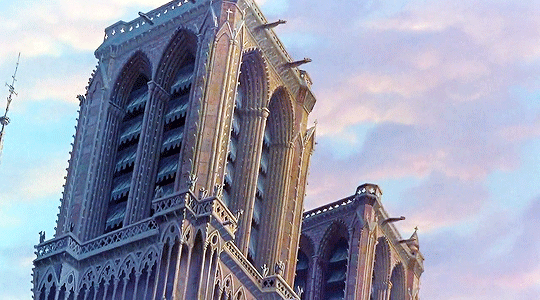
Our film begins in complete darkness, accompanied by resounding church bells and the amazing vocalizations of the English Opera Company, and from the very beginning, I’m just enveloped by the embrace of Alan Menken and Stephen Schwartz’s unbelievable score. Choral music in general has always been something special in my family. My mum and dad were in choirs a lot of their lives: they even first met when they joined the San Diego Master Chorale in the 80′s. Choral music remains one of my mother’s greatest loves and passions, and when I saw Hunchback, it made the choral music my parents loved so much, which focused around a faith I hadn’t been raised with and didn’t believe in, that bit more accessible to me as a child. Mum, who studied Latin in college, went on to teach me about all of the chants and phrases Menken and Schwartz added to each song so that I could more appropriately sing along. It remains one of those Disney soundtracks that cemented our close bond, and I’ll always treasure being able to see the La Jolla Playhouse production of The Hunchback of Notre Dame with my mum and getting to hear the amazing choir and instruments live.
The Bells of Notre Dame, as an opening number, cannot be matched in how it introduces us all to the story, characters, themes, and tone of the piece. In just a few minutes, the music and lyrics perfectly showcases our setting, the theme of what makes a man, the atmosphere of fear and injustice, our villain, and our hero. Menken and Schwartz previously worked together on Pocahontas, but Hunchback in my opinion easily outstrips their previous collaboration. The use of church bells of all sizes to convey the solemnity, mystery, and grandeur of the cathedral at the center of the proceedings, and the clever use of Latin phrases -- it’s just unbelievable! As one example, in the sequence where Frollo (a judge in this version, as opposed to the Archdeacon) chases Quasimodo’s mother up to the stairs of Notre Dame and she pounds on the door, crying for help, the choir sings “Quantus tremor est futurus quando Judex est venturus,” which means, “What trembling is to be when the Judge comes.” And sure enough, the line comes to a horrible, horrified halt when Judge Frollo snatches the woman’s child away and throws her to the ground.
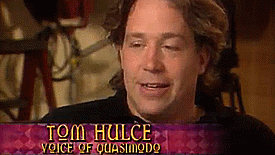
After one of the most epic musical introductions in a Disney film, we meet our sweet, gentle hero, Quasimodo, voiced by Tom Hulce, who is just such a ray of sunshine. Although I loved hearing Michael Arden as Quasimodo on stage, Tom Hulce will always be my Quasimodo. When I was a teenager, I went through a horrible “hating the world” phase where I only ever saw pain and suffering and felt not only powerless to make anything better, but worthless as well. During that time, I turned my back on a lot of the things that had brought me joy, feeling almost unable to enjoy them anymore. One of the very few exceptions, however, was this movie and especially the character of Quasimodo. When I was at my darkest points, Quasimodo never failed to bring me some light, not because he was particularly funny, but because for all of the misery in his circumstances, he never faltered in being gentle, creative, and kind. Looking back on how I’d been, I wish I’d had just a shred of Quasimodo’s grace back then. I wish I hadn’t allowed myself to fall into despair and resentment. Since I can’t go back, however, I keep Quasimodo in my mind sometimes whenever I’m going through something difficult. He’s kind of become a guardian angel of sorts to me, reminding me that my life is a precious gift and I shouldn’t take anything for granted. And really, I couldn’t do that if not for Tom Hulce and Quasimodo’s supervising animator, James Baxter. I truly am grateful to both of them for giving me a character that even now can be a symbol of everything I wish I could be.
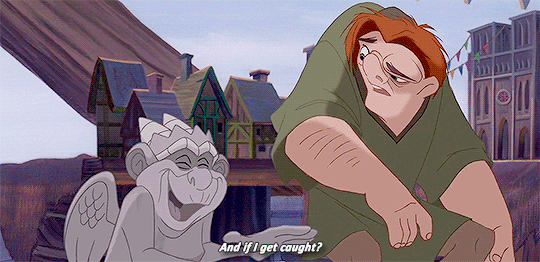
Unfortunately along with Quasimodo, we also meet the gargoyles, Hugo, Victor, and Laverne. As a kid, I actually liked the gargoyles all right, but as an adult...yeah, they really break the mood. Badly. The worst offender is easily Hugo, which is a shame because I like Jason Alexander as a performer, but he just goes way too over-the-top-obnoxious. It would admittedly not be as bad if it were clear that the gargoyles were all in Quasimodo’s head, but Djali sees Hugo come to life at one point and they later help Quasimodo fight off the guards. I greatly prefer the way the gargoyles are handled in the stage production, where all of the saintly statues have their own voices that nonetheless reflect what Quasimodo is thinking and when Quasimodo hits his lowest point before Esmeralda’s execution, he forcefully banishes them out of his head.
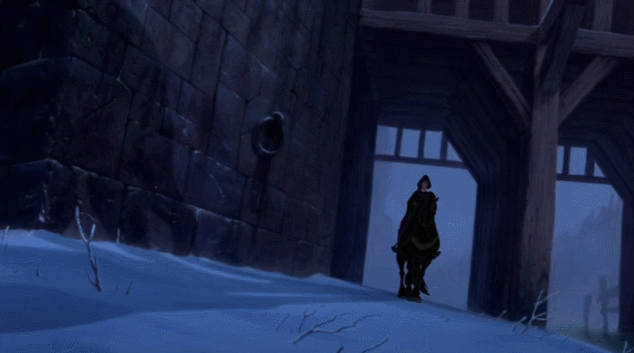
Even though the comic relief is handled poorly, I certainly cannot say the same for the villain. Judge Claude Frollo is easily one of the most evil villains in Disney history. Tony Jay’s vocal performance is just chillingly resonant, commanding your attention and making you subconsciously shrink in on yourself whenever he speaks. It makes for a despicable, cold, cruel man -- the antithesis of a father, the true embodiment of a monster. Frollo is often compared to Mother Gothel from Tangled in how they both lie to, control, and emotionally abuse their charges (Quasimodo and Rapunzel, respectively), but I personally find Frollo so much worse than Gothel, because he not only cuts Quasimodo off from everyone, but he indoctrinates a gentle, kind soul like Quasimodo in his racism and intolerance against those different from him -- including Quasimodo’s own people, the Romani. Mother Gothel hoards Rapunzel away like a dragon hoarding treasure -- Frollo treats Quasimodo like a burden, beating into him that no one else would want him and that Frollo was such a “good man” to take him in. It’s just vile.

And now we come to my single favorite Disney song of all time -- Quasimodo’s aria, Out There. From the time I was little, this song spoke to me like few others did. Growing up, I was an only child with a huge imagination surrounded almost entirely by adults and who had a lot of difficulty relating to kids my age. I often liked being on my own, but it didn’t change how I often felt different and detached from the people around me, and as I got older, that feeling only increased. I moved a lot in my childhood, making it difficult for me to plant roots, and I rarely followed trends or popular norms, so I constantly stayed in the fringes of the crowd, enviously looking on at those who could fit in more easily than I could. I always tried to hide my insecurities, but they were still there, and when those insecurities took hold, I would often imagine the world being a place where I could be myself, just like Quasi does. Quasimodo’s longing to be “part of them” and lamentation of people being “heedless of the gift it is to be them” has always resonated with me, and even though it’s hard for me to sing Out There without shifting octaves, my heart swells every time I hear it.
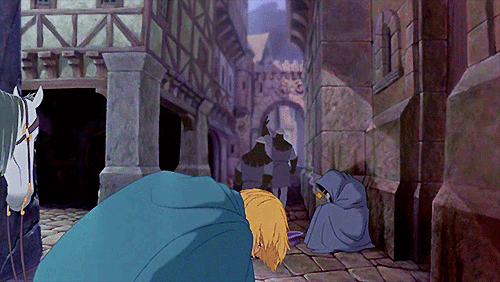
The Captain of the Guard, Phoebus, is easily the biggest liberty that Hunchback adaptations have made with the original novel. The book version of Phoebus was more like Gaston from Beauty and the Beast than how he’s portrayed here, but I frankly have no complaints. Kevin Kline is wonderfully dry and witty in the role -- he’s more than a match for Esmeralda, being brave, noble, and sarcastic with seemingly no prejudice for those different from him. And then yeah, as for Esmeralda herself...as Phoebus says later, “what a woman!” Esmeralda was one of my very favorite Disney heroines as a kid, and she still is. The character of Esmeralda is often rather saint-like in her incarnations, but here we see both the “angelic” and “demonic” sides of her -- she’s fiery, but kind; rebellious, yet noble; anti-authority, but patient; distrustful, yet loyal. In the musical adaptation, when Esmeralda is first revealed, we hear Frollo, Phoebus, and Quasimodo sing this about her --
Frollo: She dances like the Devil!
Phoebus: She dances like an angel --
Quasimodo: An angel!
Phoebus: -- but with such fire!
Frollo: Such fire!
All Three: Who is she?

This is Esmeralda’s characterization and her relationship to the three male main characters in a nutshell. Quasimodo only sees the best of Esmeralda; Frollo only sees the worst of her; and Phoebus sees her for everything she is...as a person. And this is why she ultimately chooses Phoebus, unlike in the book where she solely chooses Phoebus because of his looks.
When we reach the Palace of Justice, I’m reminded that I have yet to accent how absolutely stunning every single background is in this movie. Yes, the animation overall is wonderful, whether in the character animation or otherwise, but there are few Disney films that have more atmospheric and beautiful backgrounds than this. It serves to give the movie such a wonderful depth and makes the setting feel that much richer and deeper. Admittedly one weaker aspect of the animation is the now-slightly-outdated CG background characters. They were made by taking a handful of templates and then mixing up their clothes and colors, so as to multiply them ad infinitum and make the crowds of Paris look bigger and more colorful. Even with that, though, you do sort of have to look carefully at the background crowds to notice, as there are lots of hand-drawn characters sprinkled in in front of those CG models that help obscure their repetition and awkwardness. Those CG crowds also make the city of Paris look appropriately overcrowded and huge, so I’m glad that they used the technology even if it was still so in-progress at the time.
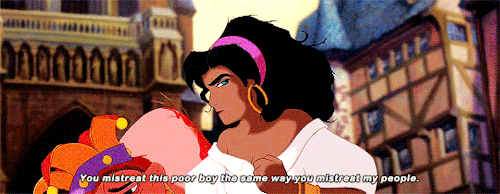
Even though Topsy Turvy starts off so fun and festive, however, it soon devolves into a terrible riot where Quasimodo is bound and tormented by the crowd. I admit, the transition is a little abrupt, but it still works for me, as people can be so easily swept away by mob mentality and those in power -- namely, Frollo’s guards -- sometimes flaunt their authority by putting down others. Fortunately Esmeralda is there to save Quasimodo and give Frollo a much-deserved verbal smackdown. The following scene, though, is another example of the mismatched tone, stretching out Esmeralda’s escape with a lot of comic “hijinks” that don’t really add anything to the film and kind of serve as a big time waster, especially after it abruptly cuts off and turns much more solemn and sad as Frollo silently confronts Quasimodo and Quasi returns to Notre Dame in shame.

Hunchback’s focus on religion is, in my opinion, one of the things that made producing an adaptation of Hugo’s novel such a bold decision. I’m not a religious person at all (Agnostic and proud), but it was still really meaningful to me to see both the good and bad associated with religion, represented by the Archdeacon and Frollo respectively. Frollo, along with Pharaoh Seti from The Prince of Egypt, taught me as a kid that evil is not always self-aware and, more importantly, how much more dangerous evil is when it garbs itself in godliness and righteousness. That’s a valuable lesson, regardless of your religious faith. God Help the Outcasts may invoke God’s name, but it could just as easily be a prayer to the world, or even just to you as an individual. The Christian faith preaches that we are made in God’s image...so when Esmeralda asks God to help her people, maybe she’s in truth asking you to try to be the loving God they need.

Something unique about Hunchback is the wonderful friendship that develops between Esmeralda and Quasimodo. From the time I was very little, I made friends with both boys and girls, so it was so wonderfully refreshing to see a story where a girl and a boy became such close friends and supported each other so much. Yes, admittedly, Quasimodo is romantically interested in Esmeralda, but when he sees how much she loves Phoebus, he both accepts their relationship and treasures Esmeralda’s friendship all the same. He doesn’t wallow in bitterness upon Esmeralda not choosing him; he loves her all the same as the first real friend he’s ever had. Esmeralda truly loves Quasimodo and treasures their friendship too -- her choosing Phoebus romantically is never framed as her teasing Quasimodo or leading him on; she simply loves Phoebus and Quasimodo in different ways. And that I find so unbelievably cool. I also like that in Esmeralda’s and Quasimodo’s conversation on the roof, there are some strains of the deleted song Someday in the instrumental accompanying the scene -- you can hear a R&B variation of Someday in the film’s credits, but originally it was meant to replace the more religious God Help the Outcasts, only for God Help the Outcasts to be chosen over it. I agree with the filmmakers’ decision, but I still like Someday too. Quasimodo’s helping Esmeralda and Djali escape Notre Dame by climbing down the towers also beautifully foreshadows Quasimodo’s dexterity in climbing down to save Esmeralda at the end of the film.

Quasimodo and Frollo are both enthralled with Esmeralda, but as mentioned previously, they each only see the angelic and demonic sides of her, which is best encapsulated by the dual numbers Heaven’s Light and Hellfire. Heaven’s Light is appropriately sweet and pure, but I can’t beat around the bush here: Hellfire steals the show, not just from Heaven’s Light but from all other villain songs in Disney history. The song starts with a choral chant praying for forgiveness, which then segways into Frollo’s demented, mad raving about his lust, fear, and hatred for Esmeralda. The words are almost terrifying in their level of conviction and paranoia, which then devolves into vindictive, destructive mania, framed by the mournful echoes for “mercy” from the choir.
Right after Hellfire, we get one of my favorite instrumentals on the soundtrack called Paris Burning. The choir’s bustling, dramatic cries trimmed by the tense strings and horns of the orchestra just evokes fear and horror as Frollo terrorizes Paris. Then Phoebus finally takes a stand, refusing to set fire to the miller’s house and then, after Frollo does it himself, leaping in to save the family from the flames. In the musical, this whole sequence is accompanied by the amazing musical number Esmeralda (which honestly, every fan of this movie should listen to, it’s really worth it), but the film handles it unbelievably well with only a short scene and an instrumental that sears the final “Kyrie Eleison” into the audience’s ears like a fire brand.
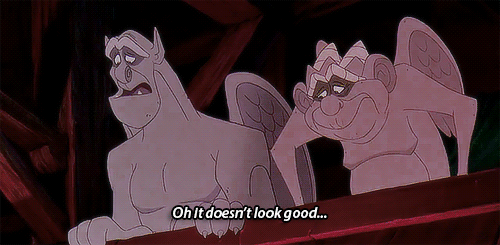
Sadly, after this amazing, epic sequence, we once again are subjected to tonal whiplash when we return to the bell tower and the gargoyles decide to sing Quasimodo a song to cheer him up. Although I maintain Hunchback has one of the best soundtracks ever recorded, what stops it from being flawless is this song. A Guy Like You is not an inherently bad song on its own, but when combined with the rest of the soundtrack, its melody, tone, and out-of-place pop cultural references are just ridiculously jarring. It’s like we’ve been transported into a completely different movie, one less inspired by a classic French novel and a critically acclaimed film about social justice and one more inspired by Disney hits of the day like Aladdin and later projects like Hercules. As sad as it is, it’s kind of a relief when it’s over and we’re brought back down to earth by Esmeralda carrying a close-to-death Phoebus into Quasimodo’s tower.
Frollo’s arrival after Quasimodo agrees to hide Phoebus is excellent in its suspense. We can sense Frollo’s suspicion, and all the while, we’re so worried for Phoebus hiding under the very table he and Quasimodo are sitting at. Then Frollo, who we’ve only ever seen as cold, conniving, and controlled, bursts into a rage the kind of which we’ve never seen before, and for a second, he’s a demon himself. After his rage is spent, he sets his cruelest, most terrible trap yet: using Quasimodo’s feelings for Esmeralda so that he can capture her and the rest of the Romani. And at first, Quasimodo almost doesn’t take the bait, thanks to a short-lived pang of self-pity. At first he’s bitter about his heart being broken and considers not helping Esmeralda, as there’d seemingly be no “reward” in him doing so...but the feeling is quelled in seconds by the memory of Esmeralda and how much her friendship means to him. Quasimodo’s selflessness and goodness wins out in its struggle with his more selfish instincts...and this, in the end, is what makes Quasimodo a hero in my eyes.
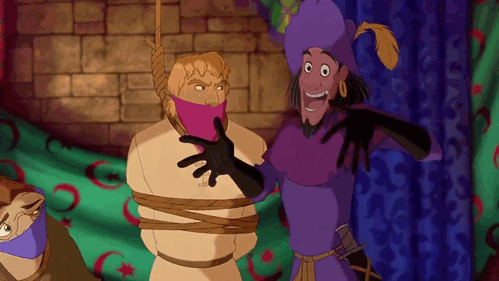
All right, I guess with our entrance into the Court of Miracles, I should address the elephant in the room. I’ve called Esmeralda’s people “the Romani” in this review, but throughout the entire film, the term is substituted for the admittedly-period-appropriate slur “Gypsy.” I knew nothing about the Romani culture when I first saw this film and I profess no intimate knowledge of it now, but even with that, I have to acknowledge that this movie doesn’t always showcase the Romani in the best light. Although Quasimodo’s parents, Esmeralda, and (to a degree) Clopin are given relative sympathy, the sequence in the Court of Miracles doesn’t do much to endear them to the audience. These victims of persecution are not really given the focus they deserve: we never learn much about their culture or about why they’re persecuted, and we don’t really get to see how they live their lives as ordinary people. To someone who doesn’t know anything about the Romani, I don’t think this film would be the best introduction to their culture and heritage.
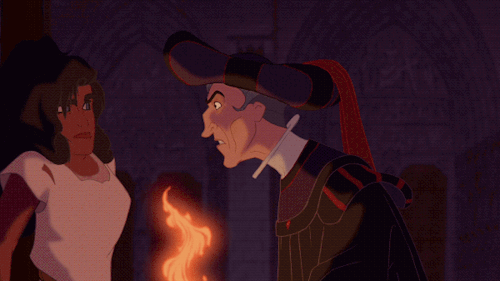
Our climax is accompanied by the best instrumental track in the film, Sanctuary! Whenever I hear this piece, I have to stay completely silent, drinking in every single line and note, so as to properly absorb its brilliance. The track has accompanied a lot of my writing in the past: it’s always helped me when I was writing a powerful, emotional climax, whether through the emotion it wrought from me or just from wanting to write a new scene to the music. This entire sequence, from a musical, writing, animation, and character point of view, is I think what made Disney decide to make this film in the first place. The pacing -- the character animation of Quasimodo tearing down the pillars -- the drawn backgrounds of Notre Dame -- the camera whirling over the never-ending crowd’s heads and up onto the cathedral as Quasimodo hoists Esmeralda over his head -- this is the heart of why the movie was made and what the entire film was building up to. This resistance against injustice and the protection of our sacred, historical institutions from hatred and cruelty is what Hunchback is and should be all about. Occasionally this battle scene is inter-spliced with comic bits that once again aren’t really necessary and kind of stick out (Laverne’s Wizard of Oz reference and Hugo’s impression of a fighter plane in particular are out of place), but it doesn’t ruin anything for me. Fortunately as the climax grows darker with the arrival of Frollo and the transition from Sanctuary! into And He Shall Smite the Wicked, the gargoyles take a backseat, and we get focus where we should’ve always had it: on Quasimodo, Esmeralda, and Frollo. Thanks to his love for his friend Esmeralda and the realization of his own self-worth, Quasimodo finally stands up to Frollo and breaks free of his poisonous influence once and for all. This line of Quasi’s has always stuck with me --
“All my life you’ve taught me the world is a dark, cruel place...but now I see the only thing dark and cruel about it is people like you!”

Even now this line is just so powerful. There was a point where all I saw of the world was its cruelties and injustices...but like Quasimodo, I’ve come to see that those cruelties are not inherent to the world or even to mankind as a whole. Humans are capable of both great evil and great good, but as long as the evil people of the world are allowed to seize control and exert their toxic influence over everyone else, the world and mankind overall will never become better. Like Quasimodo, we must stand against those who’ve embraced cruelty and hatred over acceptance and love. We must protect the brighter parts of the world that evil so wishes to snuff out. It’s a moral I think has only become more relevant and important over time.
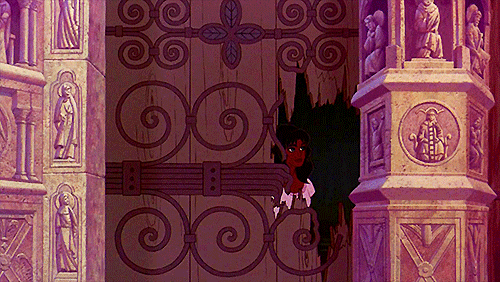
Unlike in the book and musical, Esmeralda survives, and as much as I’ve heard people try to argue Esmeralda living is not true to the spirit of the original novel, I think it really suits the story being told and really feels just for both characters. Quasimodo deserved happiness; Esmeralda deserved happiness; and most importantly, this all the more highlights how different Quasimodo is from Frollo. Frollo says to Esmeralda, “Choose me or the fire” -- basically, if he can’t have her, he doesn’t want anyone else to...but Quasimodo doesn’t think that way. He cherishes Esmeralda and her friendship without any caveats or conditions: therefore him losing Esmeralda, whether to Phoebus or to death, doesn’t prompt him to commit suicide like he did in the novel. It’s not only a more uplifting ending, but I think a lesson in the selflessness of love, even if it’s just platonic love. And because Esmeralda loves Quasimodo just as much as a friend, she leads him out into the sun, where he finds even more of the love he deserves from the city he wished so much to belong in. Quasimodo doesn’t get the girl, but that was never what he wanted in the first place: it was merely to be accepted as he was.
The Hunchback of Notre Dame was one of the most formative films of my childhood, right up there with Beauty and the Beast, The Prince of Egypt, and Anastasia, and it remains my second favorite Disney animated film of all time. With time, I’ve seen more and more of its flaws, but those flaws don’t ruin what in the end is one of the most daring, revolutionary projects Disney Animation has ever tackled. Its artistry, from the backgrounds to the character animation, is exceptional; all of its major human characters are multi-faceted, complex, and real; its themes are eternally relevant and powerful; and its score and nearly all of its songs are just through the stratosphere in their quality. Hunchback, along with Beauty and the Beast, made me fall in love with France from afar as a child, a love affair that has only become more and more intense through the years, and Quasimodo and Esmeralda even now are so close to my heart. I wish so much to be as kind and gentle as Quasimodo and as brave and noble as Esmeralda, and I can only hope that at some point, if I ever visit Disneyland Paris, I might finally meet them. The Hunchback of Notre Dame may not have gotten the appreciation it deserved when it first came to theaters, but I’ll always be happy to hear Disney fans remembering it as fondly as I do. Who knows? Maybe someday, the world will be wiser and will give this film its time in the sun at long last.
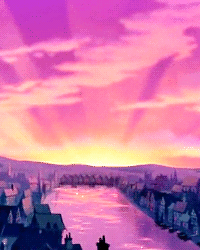
#d-views#disney reviews#the hunchback of notre dame#disney#opinion#analysis#reviews#oh boy here i go
18 notes
·
View notes
Text
Wither Tinkerbell? Part 1: Only 90s Kids Remember (KH liveblog)
I was doing a liveblog, wasn’t I, before the last week got so crazy I barely had the energy left to smash the reblog button. What was I liveblogging again?
*squints at hand* K... ka... Kangdamn Hats? Sure, I guess. Where did we leave off?
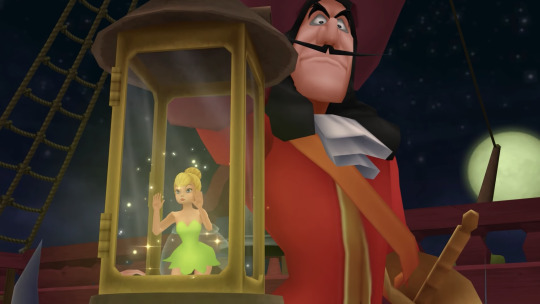

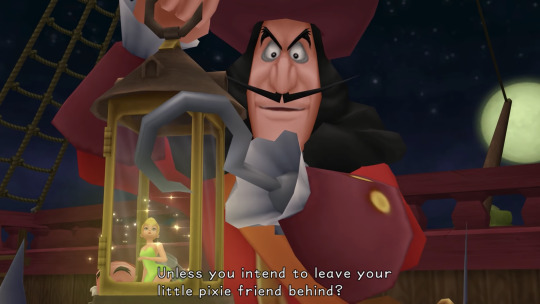
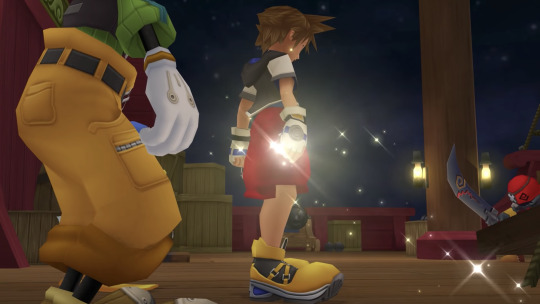
oh
Sora - for those who don’t remember, an idiot - surrenders to Captain Hook because Captain Hook has Tinkerbell in a lamp. That’s Tinkerbell, who Sora has had all of one(?) interaction with, if by interaction you meant ‘bystander’. Tinkerbell, whom Sora has no relationship with or reason to give a damn about. Sora, who has basically just been told where Riku has taken Kairi - his sole motivating factor for hours of this game - decides ‘Oh no not Tinkerbell of course I will surrender, even though there’s a paltry bullshit number of enemies here that I could take instantly.’
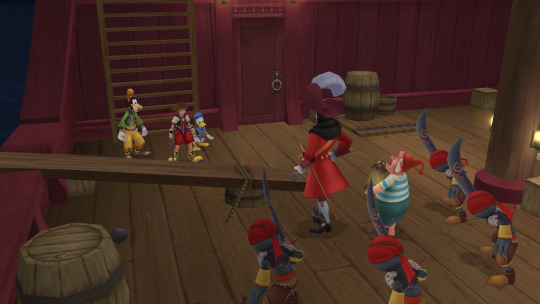
FOUR HEARTLESS AND ONE DUDE WHO IS JUST A DUDE WITH A SWORD AND A PROSTHETIC HAND WITH LIMITED FUNCTIONALITY! (”What about Smee you ask? Ha ha - Smee won’t do shit and you know it.) Sora, it must be recalled, has at this point fought an Ursula 1000 times his size, an Oogie Boogie the size of a skyscraper, Jafar imbued with ultimate cosmic power, and... some British dude with a gun riding some kind of praying mantis? (It was not clear.) But here Sora’s like: “Oh, no, these are odds I cannot face. Not with poor sweet innocent... Tanker Ball, was it?” *Deep Breath* So I got a lot of messages over the last week, most of them about my Kingdom Hearts liveblog. Some of them were really complimentary and if I forgot to thank you personally please forgive me for doing so. Some were less complimentary. Some were what I might call, mmmh, ‘ornery’ or perhaps ‘snotty’ (Some messages were critical without being shitty - I’m not talking to you). You see, I had committed the grave sin of voicing an opinion about Kingdom Hearts without having first played everything in the series - indeed, I sometimes got the impression that I had committed some sort of sin by being born not already knowing the entire legendarium of Kingdom Hearts broader mythopoetic chronicle. At the very least, I was certainly not bringing enough nostalgic childlike wonder-reverence to the table to be able to judge the game ‘fairly.’ In this praxis, Kingdom Hearts - i.e. Kingdom Hearts I the first game - is beyond linear criticism: because any possibly flaw is explained or massaged away in subsequent works, any perceived flaws in the original are something on the order of temporal hiccups, mere quirks of chronological progression and best ignored. Like the Tralfamadorians, I should absorb Kingdom Hearts only as a holistic whole: as it is ‘complete’ in the future it is complete now, for all times are one time and past and future are only the observances of lesser mortals unenlightened enough to step without time. Let me offer a counter-proposal: THIS GAME BAD THIS IS A BAD GAME THE WRITING IS BAD, UNGOOD, AND BAD THE QUALITY I WOULD ASIGN TO THE WRITING OF THIS GAME IS ‘POOR.’ ON THE BADNESS SCALE OF NOT-GOOD, IT RANKS ‘BAD.’ IF ASKED TO OFFER A EXAMPLE OF A WELL-WRITTEN GAME, THIS WOULD NOT BE THE CHOICE THAT I WOULD MAKE
This is the scene that comes next:

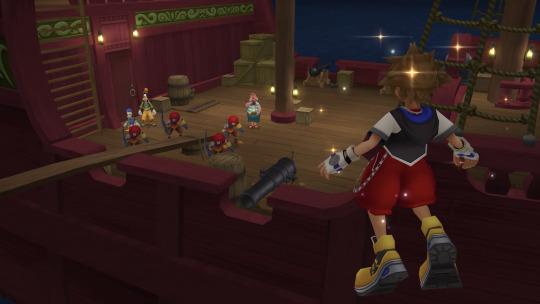
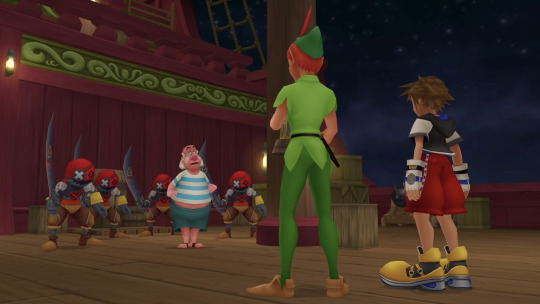
Sora is made to walk the plank, Hook shits himself about the presence of the crocodile and buggers off, leaving Tink with Smee the Useless One. Peter then snatches Tink from his hand. It takes all of 10 seconds, and makes the entire point of the previous ‘surrender or Tink gets it’ moment as ephemeral as it is inconsequential. This game has a problem that I am starting to call ‘tension cul-de-sac’ - it’s when a scene introduces a problem or crisis that is resolved within the same scene, sometimes within the same cutscene. Tension is not allowed to grow or develop or have any impact beyond the moment - and frequently it’s undermined further by the game’s long and awkward pauses, it’s bad eyelines, or the intractable problem of lugging Goofy’s dumb ass across an entire game and trying to pretend anything can be given dramatic weight with that fucking clown. You know what, no, that’s unfair - let’s talk about A Very Goofy Movie for a moment. I wasn’t much of a Disney kid - to be a Disney kid generally required money, which we Did Not Have. The Disney channel sure didn’t air with any of the basic packages we could only sometimes afford, and you sure as shit didn’t get it as ‘the only channel we sort of got’ when we couldn’t afford it and had to rely on the aerial (look it up, children.) So I didn’t grow up watching the Disney channel. I am pretty certain that those times we did have the basic cable package it didn’t come with it - the Disney channel only came with the super fancy package with the 200 channels for middle class people with La-Z-Boy chairs. (Guys, you should know that I am old enough to remember the day when cable came to this country and the TV went past channel 29 for the first time - it was a literal event. The whole country had free cable for the first month or so, and for a least a month before cable went live the channels aired non-stop trailers of their future content, and it was so wild that you could could scroll for channel after channel and see something other than static. I feel so old.) Anyways, I wasn’t a Disney kid. As noted earlier I had a couple Disney movies, but I was taught pretty early on what a gross and shitty company Disney is - my mother was a poor progressive who did what she could to keep me woke, and I think it also helped her blunt any enthusiasm or ill-will I might have for never being able to go to Disneyworld. If I didn’t give a damn about Disney as a brand then that was a whole lot of merch we couldn’t afford that I didn’t want. (One day I will right a big old essay about how capitalism hurts poor kids with materialism, and why Pokémon, Disney, POGs™, Crazy Bones, and a whole lot of other 90s franchises predicated on mass purchases did so much to harm my self-esteem as a kid. But that’s not today.) No, I was a Looney Tunes kid, because they were A) Actually funny and had bite without being saccharine dribble B) aired on cheap channels, and C) outside of a weird trend of Looney Tunes in Hip-Hop clothing and that brief blip that was Space Jam, not highly marketed. But I did see A Very Goofy Movie. More than once - the library probably had it. I remember having righteous indignation about that movie. Goofy, who just wanted to have fun with his son, was treated like garbage, because Max was the worst kind of eye-rolling 90s teen who did not want to give a shit about anything that wasn’t ruthlessly contemporary. This scene?
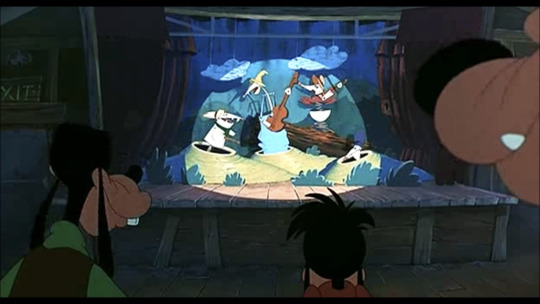
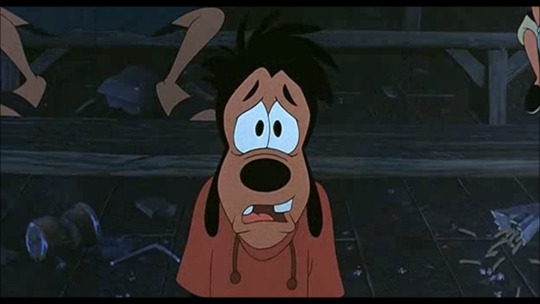
MAN FUCK YOU, MAX! His dad was trying so hard and all Max could do was be a shit. I mean sure, I got what was getting under his collar: Roxanne was sweet and cute and who wouldn’t want to take her to a dance, and Pete had the world greatest god-damn RV, and Goofy’s verbal ticks can be somewhat grating - but for fuck’s sake, Max. As someone who often felt mortified by his father (my dad was the guy who would go tell older kids off if they were being BAD and kull wahad was that squirmingly mortifying) you’d think I’d have empathized with Max more but no - even as a kid I saw Max’s in-the-moment coolness desperation for the sad peacock display it was. (CONTINUED IN PART 2)
#tinkerbell#peter pan#captain hook#smee#max goof#a very goofy movie#roxanne#kingdom hearts#sora#donald duck#goofy#dukeofriven liveblogs kingdom hearts#disney
4 notes
·
View notes
Text
Reason why a main LGBT ship in Voltron MOST LIKELY won’t be canon
Just a thing I’ve meaning to write for awhile now. Just to make clear, I’m not writing this bash any ships, even though I personally dislike Klance (VERY MUCH), but thats not what Im doing today. This is just to discuss a thing the majority of the fandom dont seen to understand, in an unbiased way with no favor toward any ships in general. Also sorry if this shows up in the tags of other shows, I’m just using them as examples for this essay.
LGBT themes are slowly becoming more and more accepted into children and family media. We’ve seen it in Steven Universe, The Loud House, Star Vs, Adventure Time, Clarence, etc. Most talked about has prolly been Steven Universe, which the characters Ruby and Sapphire, Pearl expressing her love for Rose, etc, and Legend of Korra where Korra was seen holding hands and leaving into the spirit world with her now girlfriend at the very end. And it’s been great to see these things become shown in children and family media now more than ever, esp for representation.
But there’s one thing people, and the fans don’t understand. Is that fight for representation. And how we still have a long way to go in many ways.
Living in SoCal, where most or if not all the major media companies are, you get to know a lot of people who work for them. People that have told me things that they have witnessed themselves or been told from their higher ups. Now since this isn’t my own personal experience with the companies themselves, I know what I’m saying here can be taken with a grain of salt, these are just what I’ve heard from people and friends that do work for Disney, Dreamworks, etc.
That even though LGBT media is getting more accepted in children and family media, there’s still a lot that won’t be accepted, that in many or most cases it’s subtle, it’s only background characters, etc. Yes, there, was Korra, but even that was subtle, we didn’t know they were together until Bryke told us it was, and they weren’t allowed to explore it until much later in a comic book series. As for Steven Universe, the gems are a very…special case. Yes it is definitely considered LGBT rep, but they do it in a way they can get away with it easier, with the fact that they are an all-female/genderless race of aliens.
A lot of the fact of this is because, the media and businesses primarily focus on ratings and money. With children’s media, it’s different than shows like South Park, Rick and Morty, Family Guy, or any shows that are TV-14 and higher, because those shows are on a completely different spectrum and can get away with A LOT more than family entertainment. Even with movies that are aimed toward children and family, yes there are times they insert themes only adults understand, but they usually are gags or have no relevance to the plot. Children and family media is more fragile cause not only are they trying to cater to kids, but also the parents that are watching too. The parents that buy the kids the merchandise and other things related to the series.
Now, the next thing I’m gonna say, please don’t get angry, I’m only speaking the truth. I am a trans guy myself, whom is bi/pan, and will always be proud to be apart of the LGBT spectrum. But with children/family media…thats still slowly being accepted because there are, unfortunately, a lot homophobia/transphobia/etc still in this world. There are still countries that make it still illegal to be apart of that spectrum. And until that all fully changes, family media will still be affected by it, even if it’s slowly starting to change for the better.
That’s where Klance, Sheith, and other main LGBT Voltron ships come in. The majority of the fandom have expressed their want of an LGBT themed ship in the series…but a WANT doesn’t always lead to a WILL. Even if the writers wanted a main LGBT ship, who says the Dreamworks executives and higher ups really will allow it? If it does happen, will you really still accept it even if it gets the same subtle end as Korra? Or even small subtle hints that goes no where?
Voltron isn’t aired just in the US and major countries either, the company has to take that into account as well. Its a business first and always will be. Yes the viewers and fandoms will always be important to the show, but sometimes, what the viewers want isn’t always what they can get away with. The story has already been written since the beginning as well, with recording beginning as early as 2015.
The fandom will prolly accuse them of queerbaiting, telling the executives why they put this moment in if it didn’t lead to anything, etc. I’ve been in plenty of fandoms where this has been states several times, with ships that had so much potential that never saw the light of day. But in the end, you need to see it’s not about just the ships. Shippers will always see things for their ships or interpret moments as canon evidence, that’s been going on since a lot of people in fandoms were even born. You just also need to see and understand it from a business and media point of view as well. Most of the time there’s always a reason.
Who knows though, maybe Voltron will be the first to break that barrier? But it’s very highly unlikely. Don’t be mad at the writers and creators, threatening them if an LGBT main pairing doesn’t become canon. Maybe they just couldn’t do it for a reason far more greater than what they can control.
And LGBT themes doesn’t have to be ships either. Even if the LGBT pair we get may only be subtle or a background pair, there’s always a chance of a trans or nonbinary character, but tbh, those are even more rare in childrens media than same-sex relationships.
Thank you for reading this if you did. I greatly appreciate it. Please share and feel free to comment, including counterpoint and criticisms, as long as they are done in a mature matter. Comments like “pee your pants” isn’t what I call very mature…
#voltron#voltron legendary defender#dreamworks voltron#vld#vld discourse#voltron discourse#lgbt representation#lgbt rep#shipping discourse
134 notes
·
View notes
Text
Analysis: Corporate America is finally divorcing Trump
New Post has been published on https://appradab.com/analysis-corporate-america-is-finally-divorcing-trump/
Analysis: Corporate America is finally divorcing Trump
But the relationship broke down as Trump failed to condemn racism, attacked major American companies, ignored the climate crisis and imposed tariffs. And the divorce was completed in spectacular fashion this week after Trump incited an angry mob that assaulted the US Capitol.
Both parties struck an entirely different tone this week with the insurrection on the US Capitol, a symbol of American democracy, proving to be the final straw.
The Business Roundtable slammed US politicians for spreading the “fiction of a fraudulent” election, warning it’s a threat to democracy and the economy. Leading CEOs condemned the violence.
And in perhaps the strongest political statement by a major business group in modern history, Timmons — a former GOP operative — called on Vice President Mike Pence and the Cabinet to consider removing Trump from power: “This is chaos. It is mob rule. It is dangerous. This is sedition and it should be treated as such.”
But critics say business leaders should have condemned Trumpism far earlier and in some ways enabled him.
“This is a lesson in not standing up to bullies,” said Eleanor Bloxham, CEO of the Value Alliance, a firm that advises boards on corporate governance practices. “By embracing Trump, they were enabling a very narrow perspective, not a long-term one.”
Senator Sherrod Brown, the ranking Democrat on the Senate Banking Committee, suggested the timing of the divorce was convenient.
“These CEOs have already gotten their tax cuts, deregulation and pro-corporate judges. They don’t really need Trump anymore, so they can finally do the right thing,” Brown told Appradab Business in an interview on Thursday. “It’s nice they stepped up with such great courage with 13 days left in the Trump administration.”
‘Oh no, Trump’
To be fair, the relationship between Trump and Corporate America has always been full of ups and downs. And CEOs did provide critical moments of moral leadership during the turbulent Trump era.
Back at the beginning, big business did not back Trump’s candidacy.
“In the primaries, the feeling seemed to be, ‘Oh no, Trump,'” Bloxham recalled of her conversations in 2015 and 2016 with generally Republican-leaning board members.
After Trump won the nomination, many business leaders threw their weight behind Hillary Clinton.
“They never saw him as one of them,” said Jeffrey Sonnenfeld, founder of Yale University’s Chief Executive Leadership Institute. Sonnenfeld recalled that some executives who are active CEOs today threatened to walk out when he brought Trump to a business summit around 2006.
Wait, there’s tax cuts?
But once Trump won the White House, the industry saw him as a vehicle for the pro-business agenda they craved — especially on tax cuts.
“In January 2017, there was great enthusiasm. He was speaking their language,” said Sonnenfeld. “The business community was quite excited.”
By the end of 2017, Trump delivered by enacting sweeping corporate tax cuts that the White House promised would create a roaring economy.
“The Business Roundtable did a deal with the devil,” said Sonnenfeld.
Trump’s tax cuts had a greater impact on Wall Street than Main Street. A lasting acceleration in job-creating investments never materialized, with the windfall largely going toward stock buybacks, dividends and mergers. By early 2019, Bank of America economists dubbed it the “investment boom that wasn’t.”
Beyond tax cuts, Trump set in motion a wave of deregulation that the business community was clamoring for after eight years of the Obama administration. And he appointed pro-business judges, including three conservatives to the Supreme Court.
“They got most of what they wanted,” said Ed Mills, Washington policy analyst at Raymond James.
Clashes over race, climate and immigration
But relations began to fray in the summer of 2017.
First, business leaders including former Disney (DIS) CEO Bob Iger and Tesla (TSLA) CEO Elon Musk slammed Trump’s decision to withdraw the United States from the Paris climate agreement.
And then CEOs led by Merck (MRK) boss Ken Frazier quit Trump’s business councils in August 2017 after the president initially failed to condemn white supremacists at a rally in Charlottesville, Virginia. The advisory committees eventually disbanded, delivering a startling rebuke to the president.
“They didn’t want to be on the wrong side of history,” said Sonnenfeld.
Silicon Valley and other major US businesses have also repeatedly pushed back on Trump’s immigration curbs, especially Dreamers, Sonnenfeld noted, saying “the business community has been one of the strongest voices in fighting the extremes of the Trump administration’s policies such as immigration.”
Too toxic?
The question now is whether business leaders will offer support to the Trump movement after his term ends January 20.
Trump and his surrogates have vowed to mount well-funded primary challenges to sitting Republicans who refused to back his attempt to overturn the election.
“You’ve got a lot of Republican businessmen wondering: Am I going to latch onto this Trump movement because it’s still low-tax and pro-energy?” said Michael Cembalest, chairman of market and investment strategy at JPMorgan Asset Management in an interview conducted before Wednesday’s siege on the Capitol.
“On the other hand, there is a lot of other stuff that goes with the Trump movement: anti-trade, intensely anti-immigration and arguably a degree of authoritarianism that isn’t in sync with the party,” he added.
Bloxham, the Value Alliance CEO, said much will depend on whether Trump faces serious consequences, such as impeachment or invocation of the 25th Amendment, before his term ends.
“If there is a strong response,” Bloxham said, “then the Trump brand will be much more toxic.”
0 notes
Text
Kiss the Girl (Peter Parker x Reader)
Summary : Y/N is coming over to Peter’s house for a sleepover. They’re watching The Little Mermaid, when a certain song encourages Peter to confess his long-kept feelings.
Pairing: Peter Parker x reader
A/N: Hi guys! The whole story is from Peter’s side. As you can see from the title, it is based on the song Kiss the Girl from The Little Mermaid. This is my first fanfiction on this blog, so feedbacks and criticism are highly appreciated. I hope you guys enjoy it :)
There you see her
Sitting there across the way
She don’t got a lot to say
But there’s something about her
Peter bounded down the stairs as the the school bell rang. Y/N and Ned are coming over to his place for a sleepover. Aunt May is coming home late today, so he’s glad to have some company.
With a smile on his face he strode to their usual meeting spot. From a distance he could already see them sitting on their usual bench, talking animatedly.
Peter could never believe how lucky he is to have such incredible best friends. Ned is so loyal, and probably the most honest person he has ever met.
And Y/N. She’s amazing. She’s never afraid to stand up for him. There’s something about her smile, her laugh that could brighten his day. Or the way her (e/c) eyes shines beneath the sun, could never fail to make his heart stutter.
Yes, Peter is in love with his best friend, he has for a while now. It started at fifth grade, when she stood up to Flash for him. They’re best friends ever since.
And you don’t know why
But you’re dying to try
You wanna kiss the girl
“Peter!” Y/N waved him over. “Ned was just telling me that he’s bailing on our sleepover.“
“What?” Peter turned to Ned. “Why?”
“My aunt is visiting today, and we’re having a family dinner. Sorry, I’ll make it up to you”
“So that means it just you and me Peter,” Y/N smiled.
“Y-yeah. Just m-me and you,” Peter stuttered, both excited and nervous for what’s about to happen.
Yes, you want her
Look at her, you know you do
Possible she wants you too
There is one way to ask her
“Which do you want, vanilla or chocolate?” Peter asked, holding up the ice cream tubs.
“Chocolate would be great.” Y/N answered as she scanned through the movies she brought with her. “What do you wanna watch Peter? I have The Lion King, Alladin, Hercules, The Little Mermaid, and Mulan.”
“That’s quite a disney collection you have there,” Peter chuckled. “I’ve never watched The Little Mermaid before.”
“Little Mermaid it is,” she said, positioning herself on the sofa before patting the seat beside her.
Peter handed her the ice cream as he sat down beside her. Picking up the remote he, started the movie.
It don’t take a word
Not a single word
Go on and kiss the girl
Halfway through the movie, Peter found Y/N’s head resting on his shoulder, making his senses go haywire. He focuses back to the movie to see that a song is starting as Ariel and Prince Eric went together in a boat. He can’t help but think of Y/N as he listened to the lyrics.
Sha la la la la la
Don’t be scared
You got the mood prepared
Go on and kiss the girl
Looking down to Y/N, Peter found himself unable to stop staring. Her hair looks so soft and he wondered how it would feel to run his hands through it. She has a soft smile on her lips as she watched the romantic scene. Oh, how he loves seeing her smile. She looks perfect.
“Peter?” Came Y/N’s voice snapping him out of his reverie. “Why are you not watching the movie? Are you bored or something?” Y/N asked turning to face him.
“I-I, no. It’s j-just that..” His eyes kept flickering toward her lips, his thoughts going a thousand miles per hour.
“It’s just what Peter?”
Sha la la la la la
Don’t stop now
Don’t try to hide it now
You want to kiss the girl
Get yourself together Peter,he thought, it’s now or never.
He took a deep breath, a poor attempt to calm his pounding heart before leaning in to kiss her.
“P-peter?”
Sha la la la la la
Float along
And listen to the song
The song say kiss the girl
As his lips touched her soft ones, he could feel her stiffen against him. He’s about to pull away, when she melts into the kiss and starts kissing him back. She tastes like chocolate from the ice cream she recently ate. The song kept playing softly in the background as they kissed, finally releasing all their pent-up feelings.
Sha la la la la la
The music play
Do what the music say
You got to kiss the girl
“You have no idea how long I’ve been wanting to do that,” Peter said breaking the kiss.
“Took you long enough,” Y/N smiled, still out of breath from their kiss. “I would’ve gotten you to watch The Little Mermaid years ago if I knew that you’d be brave enough after hearing the song,” she smirked, she loves teasing him.
“Hey! You know I don’t need a song to be brave enough to kiss you,” protested Peter, as he pouted.
“Prove it then,” Y/N smiled as Peter leaned in to capture her lips once more.
-
Peter stirred from his sleep as a flash illuminates the dark room. Peeking from one of his eyes he sees you beside him sleeping peacefully. Lifting his head he saw aunt May with her phone poised towards him and Y/N.
“Aunt May?” What are you doing?“
“Sorry, you guys just look so cute together sleeping on the sofa, I can’t resist to take a picture,” she whispered, smiling giddily.
He had a stupid grin on his face as he told her the good news. “I’m glad you think so, because I think we’re together now.”
Aunt May smiled, “I’m happy for you guys. Good night Peter.” Blowing him a kiss, she went inside her room.
Shifting his gaze back to Y/N, Peter smiled as he snuggled closer to you. Sighing in content, he put his arm around you.
“I’m sure no one could be happier than I am right now,” Peter whispered before closing his eyes and enter his peaceful slumber.
You’ve got to kiss the girl
You wanna kiss the girl
You’ve gotta kiss the girl
Go on and kiss the girl
#peter parker x reader#peter parker fluff#peter parker imagine#tom holland x reader#tom holland imagine
899 notes
·
View notes
Text
“Only what you take with you”: Extra-textual interaction with Baby Driver, mother!, and Star Wars: The Last Jedi

“What’s in there?” “Only what you take with you.”
Months ago, I saw Edgar Wright’s Baby Driver, and I couldn’t quite explain my cold reaction to it. As the sum of its parts, it should have been a no-brainer, sure to be favorite. Its soundtrack was full of soulful tracks meticulously curated by Edgar Wright and mixed by editors and the music department. Its stunt driving was breathtaking, orchestrated by a small squadron of stunt performers. Its cast was an alchemical brew of charisma and distance, charm and menace. It should have been one of my favorite films not just of 2017, but of my lifetime of watching movies and haphazardly ranking and re-examining what I can take from them. I admired Baby Driver from a distance, appreciating the stunts, but I couldn’t feel the emotional connection to it that would have anchored it as one of my favorite films. The confusion between this appreciation for the craft and the lack of emotional connection actually kept from writing about the movie because I felt that I had nothing to say about it.

Months later, I saw Darren Aronofsky’s mother! and couldn’t wait to talk about it with the person I saw it with, with anyone who saw it, and with anyone who might be interested in seeing it. It was my mission for a few days to share my passion for this film, something I hadn’t felt since Mad Max: Fury Road. My evangelism for mother! was met by disdain from friends who had hated what Aronofsky was trying to do in that film and his execution; talking about the film with them was the most fun I’ve had in engaging with a film in a while.

Today, I saw Star Wars: Episode VIII: The Last Jedi, with an open mind and low expectations after how listless and small I felt The Force Awakens was. I started tearing up during the opening scrawl; I started sobbing quietly into my coat when Carrie Fisher first appeared on screen. The film itself had done almost nothing to earn this depth of emotion from me at that point, but I felt overcome. When I stepped out, I felt a release and peace; I had needed that experience beyond going to watch a film on a Sunday morning on a whim.

In each case, I concluded that the secret ingredient was in me all along. I didn’t connect with Baby Driver because I didn’t have the anchors to engage with it completely. I didn’t obsess over car-based action movies like Bullitt, The Italian Job, or The French Connection because I didn’t see them during my formative years. I saw them as an adult when I was trying to build a mental library of films that I could reference so I could appreciate the films that came after in context. I didn’t grow up listening to the music that peppered the film’s soundtrack. My point of connection was actually my admiration for Jon Hamm transferring the menace that laid under his performance as Don Draper in Mad Men into violence as Buddy, but admiring an actor’s performance as the film’s antagonist only got me so far. So, without the anchor, my attention was left adrift as I watched the film, left unsatisfied by the relationship between Elgort’s Baby and Lily James’s Debora that never reached the nuclear temperatures that would have provided an emotionally resonant explanation for why they would fall madly in love with each other and why Debora would be devoted to Baby through the years of his prison sentence. I admired the stunt work, but the story felt like it was going through the motions because I didn’t care if Baby was able to ferry his crew safely or survive their betrayals or if Baby would be able to escape Doc’s control. An emotional connection is what helps the viewer close the distance between their eyes and their hearts, and all I had left while watching Baby Driver was the intellectual appreciation for the craft that my brain and my eyes could put together. I’m sure Wright referenced the films, like Vanishing Point or The Blues Brothers that influenced Baby Driver, but I couldn’t play the spot the reference game because I don’t have the contextual knowledge.
With mother!, I could easily identify the game that Aronofsky was playing because he was referencing a fundamental text in Western culture. So, for the first half of the film, I was awed by the audacity that Aronofsky would try to play coy with his retelling of the Book of Genesis and trying to anticipate how he would keep playing the game when he would reach the life of Jesus Christ. I had seen depictions of the relationship between the Judeo-Christian creator God and Mother Nature before in E. Elias Merhige’s Begotten, and I spent years engaging with the idea that the books of the Bible could be treated as literature and with the idea that God could be considered the protagonist of the Biblical narrative through analyses like Jack Miles’s God: A Biography. Aronofsky combined religious caricature with the domestic comedy of a an oblivious husband, a frustrated wife, and guests who outstay their welcome. Because Aronofsky worked with a fundamental text, the film could also be open to interpretation, from a fairly straight retelling of chapters 1-11 of the Book of Genesis and a reinterpretation of Jesus Christ that would fit comfortably along side Miles’s Christ: A Crisis in the Life of God and Begotten to an environmental parable to criticism of organized religion. It could be seen as Aronofsky’s companion piece to his previous film, Noah, which focused on chapters 6-9 of the Book of Genesis, or the latest cinematic step in Aronofsky’s search for spiritual meaning that began with Pi. I am, admittedly, a fan of Darren Aronofsky’s work; we’re alumni of the same summer camp, and seeing his name is often enough to engage my interest in a film. With all these potential points of association, it was easy for me to connect my eyes, my brain, and my heart to the film.
I commented to a friend that I couldn’t believe that it’s been only two years since we saw Mad Max: Fury Road together because it’s felt so much longer. Despair can elongate the sense of time’s passing; 2017 has been full of anger and despair, so it’s no wonder that this year has felt like a decade. When I sat down to watch The Last Jedi, I was unprepared by how badly I needed something to tell me that there was still hope in resisting against oppression, corruption, and the general darkness. I could point to how nonsensical the First Order’s strategy of engagement with the Resistance was, how confusing the First Order’s actual strength of force was, and how tangential Finn and Rose’s story felt to the film’s larger narrative. On the other side, I could point to how Rian Johnson mastered the craft of giving viewers memorable tableaus, from the blinding red of Supreme Leader Snokes’s throne room to how the salt changes color as the First Order and the Resistance battle on Crait. In the end, it was the emotional charge of seeing Carrie Fisher in her last role, wondering how Fisher and Mark Hamill bore aging in front of us, lifting the weight of years to sift through memories of watching Star Wars movies and shows, reading Star Wars books, listening to the music of Star Wars that struck a chord. It was the thought of how popular culture has appropriated Princess Leia into a symbol of resistance, and how that appropriation is tied to the fact that Star Wars is an intellectual commodity marketed and sold by one of the biggest corporations in the world creates a tension that works for and against it. Roger Ebert described movies as “like a machine that generates empathy.” I recognize how silly and naive this sounds, but The Last Jedi, a film that cost hundreds of millions of dollars to make and will nearly billions for The Walt Disney Company, generated hope for me. I think Rian Johnson realizes that tension too; it’s not a coincidence that he ends The Last Jedi with a scene of a child telling two other children the legend of how Luke Skywalker stood up to the First Order alone and how that sparks one of the listener’s hope. Even if the message was made and transmitted for the sake of commerce, the power lies in how the audience receives it and what it inspires the listener to do.



In each case, the secret ingredient was what I was took with me from outside the cinema. I didn’t have the context to play the “spot the reference” game with Edgar Wright’s Baby Driver, so I was left grasping for an emotional connection. Between my appreciation for Darren Aronofsky’s films and years of thinking about religion, I was fully prepared and engaged with the game that Aronofsky was playing with the audience with mother!. And my unsuspected craving for hope with me left me unable and unwilling to nitpick The Last Jedi, to carve it up into its component parts because the sum is too great.
#baby driver#edgar wright#ansel elgort#lily james#jon hamm#elza gonzalez#jamie foxx#jennifer lawrence#mother!#darren aronofsky#javier bardem#michelle pfeiffer#ed harris#star wars#star wars the last jedi#the last jedi#rian johnson#daisy ridley#John Boyega#Oscar Isaac#Carrie Fisher#mark hamill#adam driver#begotten
5 notes
·
View notes
Note
1-200
200 Questions to Ask Me!
200: My crush’s name is: ( ͡° ͜ʖ ͡°) 199: I was born in: Michigan198: I am really: Depressed, bored, hungry, lonely197: My cellphone company is: Verizon196: My eye color is: Brown/ugly195: My shoe size is: 11194: My ring size is:8.5193: My height is: 6″3192: I am allergic to: Medicine, tree dust191: My 1st car was: The piece of shitmobile190: My 1st job was: Illegal ( ͡° ͜ʖ ͡°) 189: Last book you read: How to Think About Weird Things Critical Thinking for a New Age. (Yes it’s a college textbook, but if you love debating with people on the internet [ though this is pointless] this book is a must read).188: My bed is: a college loft that I fear is going to fall any second. 187: My pet: Pet no, mascot my HARAMBE FLAG! 186: My best friend: @rinkatai @aesthetichalestorm @bookerdewiit 185: My favorite shampoo is: Whatever I have in the shower when I’m showering184: Xbox or ps3: either, but Mario Kart trumps them all183: Piggy banks are: cool if they aren’t the break ones182: In my pockets: wallet, room keys, a “Thanks asshole” note someone graciously wrote me 181: On my calendar: Peoples birthdays, and predictions for stupids shit. (5 for 6 on them being right)180: Marriage is: dumb, combining debt together over a stupid ceremony. Why not just say fuck it and save the money for a sweet house and lots of animals179: Spongebob can: keep coming out. I love that show. If given the time, I could probably quote almost all the episodes178: My mom: is my mom177: The last three songs I bought were? People buy songs? I can name albums: Reaching into infinity, Begining of the End, One More Light176: Last YouTube video watched: https://www.youtube.com/watch?v=jsx0d3p4SMQ
175: How many cousins do you have? That I talk to, 3,4. total like 22+
174: Do you have any siblings? Youngest of 5
173: Are your parents divorced? No
172: Are you taller than your mom? Yes
171: Do you play an instrument? Guitar and Trombone
170: What did you do yesterday? Stayed up til 5 am playing Garrys Mod
[ I Believe In ]
169: Love at first sight: Sort of, doesnt work out though
168: Luck: Luck is an undeclared claim.
167: Fate: Nope
166: Yourself: Never. I always fail
165: Aliens: Hard to say,
164: Heaven: No
163: Hell: I am a living hell
162: God: not a god, but a something
161: Horoscopes: Nope
160: Soul mates: Yes
159: Ghosts: No
158: Gay Marriage: Marriage is Marriage, IMO calling it Gay marriage is trying to make it different than regular marriage.
157: War: Yes
156: Orbs: YEs
155: Magic: No
[ This or That ]
154: Hugs or Kisses: Hugs
153: Drunk or High: Both. ( ͡°( ͡° ͜ʖ( ͡° ͜ʖ ͡°)ʖ ͡°) ͡°)
152: Phone or Online: Phone
151: Red heads or Black haired: Red Heads, but thats just from my experience
150: Blondes or Brunettes: Brunettes
149: Hot or cold: Mild
148: Summer or winter: Winter
147: Autumn or Spring: Spring
146: Chocolate or vanilla: Vanilla
145: Night or Day: Night
144: Oranges or Apples: Apple
143: Curly or Straight hair: Curly
142: McDonalds or Burger King: BK
141: White Chocolate or Milk Chocolate: White Chocolate
140: Mac or PC: PC
139: Flip flops or high heals: Flippers
138: Ugly and rich OR sweet and poor: Sweet and Poor
137: Coke or Pepsi: Don’t care, just gots to be diet
136: Hillary or Obama: Norm is my OTP ( ͡°( ͡° ͜ʖ( ͡° ͜ʖ ͡°)ʖ ͡°) ͡°)
135: Burried or cremated: Cremated, that way I’ll still be around people when im dead because no one would come willing if I was buried
134: Singing or Dancing: My singing is 1 of a kind
133: Coach or Chanel: Chanel because meme
132: Kat McPhee or Taylor Hicks: Kat McPhee, only because I don’t know any of them and Hick is a bad name with my life.
131: Small town or Big city: Both
130: Wal-Mart or Target: Target
129: Ben Stiller or Adam Sandler: Ben Stiller
128: Manicure or Pedicure: Pedi
127: East Coast or West Coast: Weast Coast ( ͡°( ͡° ͜ʖ( ͡° ͜ʖ ͡°)ʖ ͡°) ͡°)
126: Your Birthday or Christmas: Birthday, people notice me :)
125: Chocolate or Flowers: Flowers
124: Disney or Six Flags: Datknee… Disney
123: Yankees or Red Sox: Neither
[ Here’s What I Think About ]
122: War: Pointless, but happens, Realistically, will never end.
121: George Bush: All politics have goods and bads, we’ve had better, but we also had far worse.
120: Gay Marriage: Always said
119: The presidential election: Popular vote and the current way are both fraud by the way America is. A completely new system is needed.
118: Abortion: Not a women so my opinion is not valid or needed. Honestly I hate kids. so Pro
117: MySpace: Last i checked (like a year ago,) its pretty much a Soundcloud.
116: Reality TV: Stupid
115: Parents: Do what they do. Different generation so their ways of parenting are theirs.
114: Back stabbers: Too many in my life… DAMN… MAYBE THIS IS WHY I AM FUCKED UP.
113: Ebay: I spend too much money on it
112: Facebook: Fuck the Zuck
111: Work: Never had a legal job
110: My Neighbors: Can go shove a knife up their asses
109: Gas Prices: Better than the past
108: Designer Clothes: I’m making a separate post about this.. I might be in a bit of trouble with my college over this.
107: College: I don’t fit in anywhere. only friends I have I went to High school with.
106: Sports: Really wish I played football in High school. I know I wouldn’t play at my school, but a smaller one I would.
105: My family: Family is family
104: The future: WIll not be brighter.
[ Last time I ]
103: Hugged someone: Too long ago
102: Last time you ate: yesterday (2:00pm 12/13/2017)
101: Saw someone I haven’t seen in awhile: Emotional abuser has a drug dealer that lives in my colleges town. Saw her :/ cried for hours.
100: Cried in front of someone: Summer 2017
99: Went to a movie theater: whenever IT came out. Got in trouble with my colelge cause of roommates
98: Took a vacation: too long ago
97: Swam in a pool: summer 2017
96: Changed a diaper: never
95: Got my nails done: never
94: Went to a wedding: Spring 2017
93: Broke a bone: with a doctor knowing never, but like 6 years ago
92: Got a piercing: None
91: Broke the law: ( ͡°( ͡° ͜ʖ( ͡° ͜ʖ ͡°)ʖ ͡°) ͡°)
90: Texted: I stubbed my nose on the elevator
[ MISC ]
89: Who makes you laugh the most: Doc
88: Something I will really miss when I leave home is: Nothing
87: The last movie I saw: Cure For Wellness
86: The thing that I’m looking forward to the most: Going home so I wont be alone with my depressing thoughts and questionable music
85: The thing im not looking forward to: going to the meeting
84: People call me: Davie Crocket Davy Divad Garbage, fucker loser, pretty much every name in the book
83: The most difficult thing to do is: pretend to be normal
82: I have gotten a speeding ticket: Talked the cop out of it with my mindfucking bullshittery
81: My zodiac sign is: Scorpio
80: The first person i talked to today was:
@rinkatai
79: First time you had a crush: 9th Grade
78: The one person who i can’t hide things from: Rink
77: Last time someone said something you were thinking: Last week
76: Right now I am talking to: Myself
75: What are you going to do when you grow up: Good question ( ͡°( ͡° ͜ʖ( ͡° ͜ʖ ͡°)ʖ ͡°) ͡°)
74: I have/will get a job: No, I cant do interviews I alwasy fuck them up or never get called back
73: Tomorrow: hopefully do something better
72: Today: Watched 9 hours of netflixs
71: Next Summer: Too far to determain
70: Next Weekend: Too far to determain
69: I have these pets: None
68: The worst sound in the world: College kids screaming because finals when they are just being cliche
67: The person that makes me cry the most is: myself
66: People that make you happy: Happy? whats that
65: Last time I cried: Today
64: My friends are: Rin Doc
63: My computer is: Fucked up because everything I own always gets fucked up
62: My School: College sucks, High School : IN A LOT OF HOT WATER
61: My Car: is a piece of shit
60: I lose all respect for people who: treat me bad… damn thats like 95% of the people I see
59: The movie I cried at was: The Producer
58: Your hair color is: Ugly Brown
57: TV shows you watch: The OFfice
56: Favorite web site: Higher or Lower Youtube
55: Your dream vacation: Somewhere with the right person
54: The worst pain I was ever in was: The emotion and things I live with everyday.
53: How do you like your steak cooked: However it is cooked
52: My room is: MY STUFF IS CLEAN roommate 1 is not
51: My favorite celebrity is: Too many to name
50: Where would you like to be: A better state of mind
49: Do you want children: NO
48: Ever been in love: Sadly
47: Who’s your best friend: Rin Doc
46: More guy friends or girl friends: Girl Friends
45: One thing that makes you feel great is: Dark humor
44: One person that you wish you could see right now: :’(
43: Do you have a 5 year plan: I only plan 5 minutes in advance
42: Have you made a list of things to do before you die: No, honestly asking 10th grade me, i only planned up till graduation
41: Have you pre-named your children: NO KIDS
40: Last person I got mad at: ( ͡°( ͡° ͜ʖ( ͡° ͜ʖ ͡°)ʖ ͡°) ͡°)
39: I would like to move to: Sanity land
38: I wish I was a professional: Musician
[ My Favorites ]
37: Candy: Sour Skittles or Mega Sours
36: Vehicle: Piece of Shit Mobile
35: President: Suliman with the Onion hat
34: State visited: Iowa.
33: Cellphone provider: Verizon
32: Athlete: Cardale Jones
31: Actor: Bill Mother Fucking Murry
30: Actress: Emma Watson
29: Singer: Davey Jones, Davey Havok, Chester, and many more
28: Band: Too many, but I will say I’ve personally met one of them
27: Clothing store: cheap ones
26: Grocery store: cheap ones
25: TV show: Office, Simpsons South Park TWD
24: Movie: Cure For Wellness Clockwork Orange, Cant remember the name, but the original hunger games… the japanese one
23: Website: youtube
22: Animal: panda pugs
21: Theme park: cedar point
20: Holiday: leif erikson day
19: Sport to watch: hockey
18: Sport to play: football
17: Magazine: ( ͡°( ͡° ͜ʖ( ͡° ͜ʖ ͡°)ʖ ͡°) ͡°)
16: Book: Too many
15: Day of the week: Monday. Because I play a game of what sucks more… I win a lot
14: Beach: na
13: Concert attended: Alice Cooper 3x, Deep Purple, Stone Sour, Skillet, Motley Crue 2x, FFDP, Wayland, Valraven, Alterbridge, Iron Maiden, going to see Judas Priest with someone in April
12: Thing to cook: Pasta and muffins
11: Food: ^
10: Restaurant: places with spicy chicken nuggets rice pudding and chicken noodle soup
9: Radio station: 101 WRIF Q106
8: Yankee candle scent: N/A
7: Perfume: N/A
6: Flower: Idk Roses or Marigolds
5: Color: Black orange green
4: Talk show host: ( ͡°( ͡° ͜ʖ( ͡° ͜ʖ ͡°)ʖ ͡°) ͡°)
3: Comedian: A lot
2: Dog breed: PUG
1: did you answer all these truthfully? Like 4 are not :/
2 notes
·
View notes
Text
The Jehanimation Awards: separating the best of 2016′s animated movies from the rest
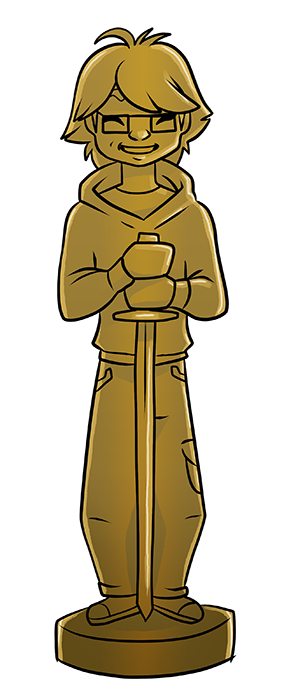
Between all the political turmoil, the near-relentless stream of high-profile deaths and the release of Batman v Superman: Dawn of Justice, it has been widely accepted that 2016 was A Bad Year. As a member of the human race, last year probably was a bit of a disappointment in most respects; look at it as an animation enthusiast, though, and the picture starts to look quite a bit rosier.
In fact, I’m going to go a step farther than that and call 2016 one of the best years for feature animation in recent memory - which is saying a lot given how much the bar has been raised since the 1990s. Since the advent of CGI tore up the rulebook and made it easier for newer studios to compete with Disney on an equal footing, it’s felt like we’ve been constantly on the cusp of a new, more diverse landscape for mainstream animation, allowing a wider range of studios and directors to present wildly different visions in a competitive marketplace, rather than a single company monotonously ruling the roost. Obviously, the conservative and formula-driven nature of the business has meant that potential hasn’t always been realised, but in 2016 we got a glimpse of how that theoretical vision would play out in reality - and it was a pretty exciting thing to behold. I can’t think of many previous years in which so many companies - from the US and elsewhere - were able to produce such a broad spread of high-quality movies for different audiences, resulting in a glut of animated movies occupying the top spots in not only the worldwide box office rankings, but also in lists of the best-reviewed films of the year.
Faced with such an embarrassment of riches, it feels difficult and somewhat reductive to pit them against each other and pick out a small handful as being the best - but that’s just what we do around this time of year anyway, so who am I to argue? Still, my intention here is not to add to the somewhat adversarial sentiments that awards season can sometimes generate; this is simply my personal evaluation of all the new animated movies I got to see in 2016, with my favourites highlighted. Your own mileage will, of course, vary, because such variety is the spice of life; with that said, I’m pretty sure this list is 100% objectively correct, so I’ve no idea why you’d disagree.
Immense thanks go to the wonderful Jamie Carr for the header image and icon for this blog! Go follow her on Twitter at @neurodolphin!
THE NOTABLE OMISSIONS
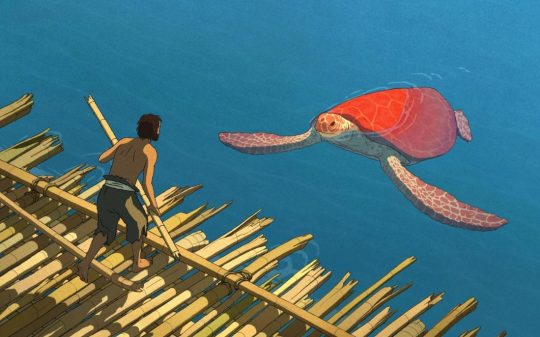
Before I get into evaluating the best of 2016’s crop, I should probably acknowledge that, contrary to assumption, I am not omniscient, and was therefore unable to see every animated movie that came out last year. There are upsides to this, as it means I missed out on having to watch bargain-bin garbage like Norm of the North or Robinson Crusoe (aka The Wild Life), and was able to judiciously pass on higher-profile but poorly-reviewed efforts like Blue Sky’s Ice Age: Collision Course and Rainmaker Entertainment’s Ratchet & Clank; unfortunately, it also meant not getting to see most of the less widely-screened animated movies from overseas, which is a great shame. I haven’t, for example, been able to see The Red Turtle or My Life as a Zucchini - two of the five nominations for this year’s Best Animated Feature Oscar - nor did I catch the well-reviewed French-Canadian production Ballerina (known in the US as Leap!). I also freely confess to being underexposed to anime, meaning I didn’t see anything from Japan this year - with one important exception, which I’ll come to later. I’ll certainly hope to correct some of these oversights at a later date.
THE ALSO-RANS
The following movies are the films that - for one reason or another - didn’t quite connect with me this year. Some are better than others, but to some degree or another I wouldn’t say they succeeded at what they set out to do.
The Angry Birds Movie
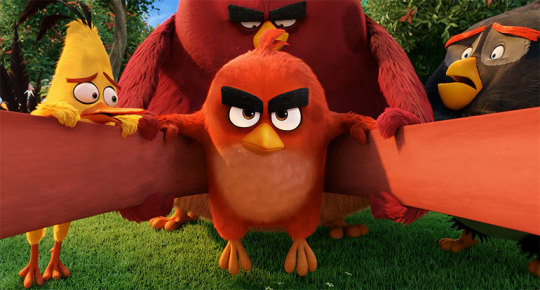
This was probably the weakest animated film I saw last year, which - given its essentially functional mediocrity - reflects pretty well on 2016’s lineup as a whole, even though it doesn’t retroactively make The Angry Birds Movie any more impressive.
I’ve already written a complete review of this film, so I don’t want to waste too much additional time on this one, but looking back I do find it striking just how middling this film was, especially when viewed in the context of everything else that came out after it. It remains deeply frustrating that The Angry Birds Movie actually did a lot of the groundwork necessary to produce a better-than-expected adaptation of a plotless physics-based puzzle game - devising a striking look, hiring great actors and laying the foundation for a potentially interesting thematic discussion on the role of anger in a healthy society - before totally squandering that potential on a script that favours lightweight, rambling and puerile comedy over any opportunity to advance the characters or emotional stakes. It’s a film that lazily follows a bog-standard Shrek-lite formula of cheap pop culture gags, toilet humour and sitcom punchlines, seemingly without realising that said playbook is now several years out of date - which, I suppose, is somewhat fitting for a belated spinoff to a mobile app whose popularity peaked about five years ago.
As I say, there are aspects of The Angry Birds Movie that are slightly better than they needed to be - and I’m willing to accept that it’s not easy to reverse-engineer a script that culminates in birds launching themselves into a pig’s castle via catapult - but I feel less charitable towards it in hindsight having since seen DreamWorks’ Trolls, another brand-derived movie that applied infinitely more honest craft and creativity to its subject matter, and achieved exponentially superior results as a consequence. The fact that Angry Birds was able to utilise its stronger brand recognition and well-timed release window to ultimately outgross Trolls on a worldwide basis just emphasises the point that this isn’t a film in need of my charity, or one worth holding up for any reason other than as an example of the kind of lazy work the rest of the industry has long moved beyond.
The Secret Life of Pets
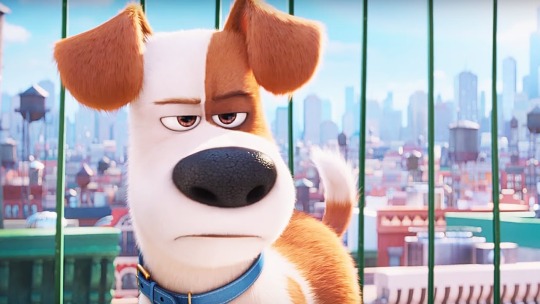
2016 was a banner year for Illumination Entertainment, as the studio not only made the jump to releasing two films within 12 months for the first time ever, but was also able to turn both into bona fide global smash hits without any reliance on their flagship Despicable Me/Minions franchise. The Secret Life of Pets was the more conventional of the two outings, with its higher box office takings showcasing the strength of the Illumination brand as it exists today; however, the film itself also offers an equally sharp insight into the how much room the studio has to grow.
As I alluded to in my recent post about Illumination, there’s a lot to admire in The Secret Life of Pets, and its great success is no mystery to me. It leans heavily on many of the studio’s established strengths, including a flair for kinetic caricature and imaginative physical comedy, and its bright visual style and design work meant it played a significant role in a broader reawakening of the general public’s love affair with talking animal movies. However, it’s also an unintentional showcase of Illumination at its weakest, particularly in its willingness to foreground shallow slapstick over meaningful story development, and its allergic reluctance to challenge the audience emotionally. That the film’s plot is essentially a beat-for-beat pet-oriented remake of the original Toy Story invites comparisons that do not flatter Illumination’s movie, as The Secret Life of Pets is an infinitely shallower film that passes up several golden opportunities to give its characters proper dimension, resulting in an experience that’s basically sweet-natured and inoffensive, but never comes close to making a lasting impression.
With $875 million grossed worldwide, The Secret Life of Pets was undoubtedly one of the year’s biggest success stories, and represents the start of a franchise with considerable potential mileage; however, the series will require a significant injection of depth, pathos and substance if the resulting series is ever going to be able to aspire to anything more than a vehicle for the episodic and rote delivery of middlebrow gags with a bare minimum of investment.
Kubo and the Two Strings
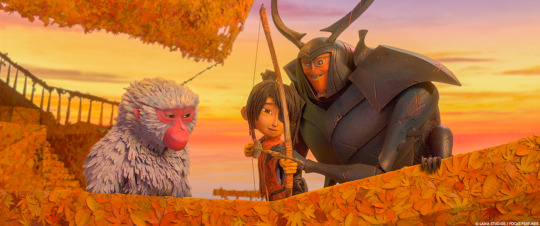
A passion project by Laika Entertainment’s president and CEO (and sadly forgotten rap legend) Travis Knight, Kubo and the Two Strings didn’t do huge business at the box office, but it’s quickly emerged as one of the critical darlings of the year, and a major awards contender. While I love pretty much everything this hugely admirable piece of work represents, I can’t quite bring myself to extend the same feeling to the film itself as a piece of storytelling.
In fact, I’d probably rate Kubo and the Two Strings as one of the bigger disappointments I experienced last year, which is a real bummer, as I have a deep and unbroken fondness for Laika’s work, dating back to their days in their previous incarnation as Will Vinton Studios. Kubo is in most respects their most ambitious film yet, blending their traditional focus on emotional intimacy and dark atmospherics with an epic fantasy sweep. When it works, it’s absolutely magnificent - their stop motion animation and design work has now evolved to the point where it almost looks indistinguishable from CGI at times, and their grasp of subtle melancholy is as peerless - but there’s a shakiness to the story’s fundamentals that I’m unused to seeing from a studio as famed for their attention to detail as Laika are. The tone lurches wildly from tearjerking grimness to flippant buddy comedy and back again; the actual quest narrative is irritatingly coincidence-driven and never more than vaguely explained, giving the audience little scope to share the journey of discovery; and most damagingly, the script doesn’t seem to know what it wants the lead characters of Monkey and Beetle, setting them up as jovially bickering sidekicks before saddling them with dramatically pivotal backstories that feel overly on-the-nose and don’t mesh with their personalities at all. The result is a film to which I gradually lost my emotional connection as it progressed, which is pretty fatal for a story that ends as intimately as this one does.
Add to that some questionable decisions regarding casting - I won’t harp on this too much, but I will say that it’s weird for a film this conscious about authenticity and tone to pass up the benefits that an Asian cast would provide in that regard, and that none of the actual cast give such indelible performances that they couldn’t have been swapped out - and you get a film ranks as my least favourite Laika movie to date. Admittedly, it’s a difficult category in which to compete, but it’s still a shame not to be able to join in the general chorus of appreciation surrounding a film that generally reflects so much of what I love about animation. I still thoroughly appreciate Laika’s work in almost single-handedly propping up the medium of stop-motion through sheer passion and bloody-mindedness, but for me the narrative elements of Kubo and the Two Strings got away from them - and when you’re making a film specifically designed to celebrate the power of storytelling, that creates a hole in the middle of the movie that no amount of technical splendour can fill.
Finding Dory

The top-grossing animated movie of the year, Pixar’s Finding Dory was always going to be a commercial slam-dunk, given the special place its predecessor Finding Nemo holds in the hearts of many; the big question was whether it was going to be able to measure up to the first movie’s legacy in terms of filmmaking. The answer? Ehhh.
That’s certainly not due to a lack of effort, of course; as I’ve touched upon in my previous post concerning this movie, Finding Dory is not a phoned-in sequel, and you can tell that returning director Andrew Stanton has put thought and consideration into how to expand the self-contained story of Finding Nemo outwards in a way that feels organic. The resulting development of the character of Dory - a mentally impaired protagonist seeking to make peace not only with her own past, but also with herself and the way her condition affects her - is rich with emotional pathos and feels like a natural continuation of Finding Nemo’s key themes, as well as forming a meaningful statement on disability in its own right.
Beyond the oasis of that central storyline, however, Finding Dory enters choppier waters. Dory’s journey may be significant in emotional terms, but dramatically it feels small, with the epic, sweeping journey of the first movie swapped for a claustrophobic single-location setting for the majority of the sequel. That reduced sense of scale isn’t helped by the flimsiness of the supporting cast, populated by half-formed ideas like Hank the octopus (who feels like he has a character-defining backstory lying on a cutting room floor somewhere) or one-note gag characters like Destiny, Bailey, Rudder and Fluke (who never come close to being properly developed). Worst of all, Finding Nemo’s protagonist Marlin is purely along for the ride this time, with very little to do other than complain in a way that becomes grating and unentertaining fairly rapidly. The result is a two-hander where one hand is significantly more developed than the other, which - as Nemo himself would tell you - makes it much harder for Finding Dory to swim in the smooth, straight lines you’d expect from a Pixar film.
That said, I’m not sure exactly what I expect from a Pixar film these days. Finding Dory is far from a bad movie, but it’s a pedestrian effort from a studio that seemed to effortlessly maintain a much higher orbit before the turn of the decade. Finding Dory owes a lot of its success to goodwill left over from those peak years, but the lack of love the movie has received on the awards circuit suggests that at least some of that is starting to run dry. There’s a Dory-style lesson to be learned there: old memories aren’t enough to sustain you forever - you have to be able to form new ones, too.
THE RECOMMENDATIONS
The following movies are the films I saw that didn’t quite make my best-of list, but nevertheless worked well enough to make a positive impression. These aren’t the year’s best animated movies - but they are good ones.
Storks
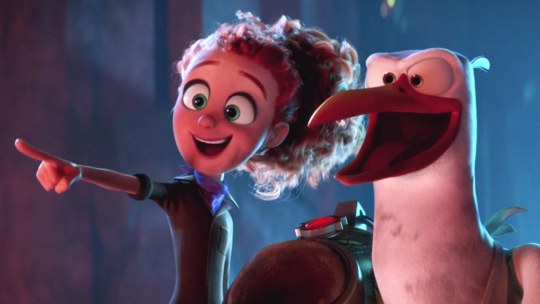
Storks seemed to come and go without anyone really noticing it happened. I myself missed it at the cinema, and catching up with it many months later, I can sort of understand why; it’s a thoroughly odd duck that doesn’t quite fit with any preconceived notion of what an animated feature would look, sound or play like. The aesthetic splits the difference between big-screen polish and Cartoon Network stylisation; the tone wants to be manic, but grounded; flippant, yet also heartfelt; rambling, but wholly plot-driven.
You know what? For all that, I rather enjoyed Storks, although I’m not sure I’d call it a completely functional film. The first animated movie from live-action comedy director Nicholas Stoller (Forgetting Sarah Marshall, Neighbors) is a relentlessly high-energy experience that is inevitably irritating and wearying at times, but feels full of a certain kid-in-a-candy-store enthusiasm for the boundless absurdist possibilities that animation can provide; it is also a movie that understands the importance of having a heart, and keeps it beating in the right place. Ultimately, Storks doesn’t have anything more profound to say than “babies are nice, and finding your family is great”, but it’s sincere about the way it says it, whether that’s through the oddly charming quasi-romantic chemistry between the avian middle manager Junior and scatterbrained teenage orphan Tulip, or through the engaging B-plot of a young boy reconnecting with his workaholic parents as they wait for delivery of a new baby brother. It’s also an understatedly progressive movie in a couple of ways - it’s nice to focus on a mixed-gender comedic pairing where the female member gets to be the zany one for a change, and you even get some pleasantly matter-of-fact representation of LGBT parent couples thrown in towards the end for good measure, albeit in blink-and-you’ll-miss-it fashion.
That said, this is also an incredibly ramshackle piece of work, full of non-sequitur narrative detours and extended joke sequences that don’t really land - antagonist Toady, an obnoxious business-bro pigeon, feels like an out-of-control SNL skit in place of an actual character, for example. That’s a weakness that cuts across many parts of the film, in fact; Stoller gives the script more of a mannered, improvisational feel than is strictly good for it, resulting in a whole lot of gag lines that feel purely like punchlines crafted by a writer, rather than effective expressions of character. Nevertheless, on balance, I’m happy that the revamped Warner Animation Group are using their post-The Lego Movie relaunch to establish a distinct identity for themselves, rather than going down the me-too route of their Quest for Camelot days; I think it’s even better that their chosen identity is one that tries to honour the company’s offbeat Looney Tunes legacy, as that’s a style we don’t see often enough in the modern feature animation landscape. Clearly, we’re going to be getting a lot of Lego spinoffs and sequels that uphold a Phil Lord/Chris Miller-flavoured variation of that approach, but that type of comedy is good for more than just endless Lego movies - and so are Warner Bros. In that respect, I’d like for Storks to be the beginning of a more diversified lineup from Warner Bros, not the end, which is why this imperfect little movie just about edged its way into my recommendations category; the quality isn’t always there, but the right spirit is there in spades.
Kung Fu Panda 3
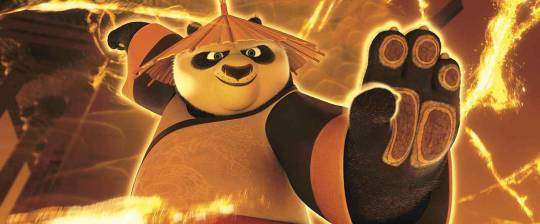
In another year, Kung Fu Panda 3 would have been a much bigger deal than it ended up being. It was a very good animated movie in a year full of them, a talking animal film coming out just as the genre suddenly became ubiquitous, and a high-quality sequel to a franchise that had probably been away from the big screen a few years too long for audiences to still be invested. Heck, even in China - the market where this US-Chinese co-production was clearly ordained to sweep aside all comers - this belated threequel had its thunder stolen, reigning briefly as the region’s highest-grossing animated movie ever before the breakout success of Disney’s Zootopia took the title away after only one month.
All of that is a bit of a shame, because - as I’ve mentioned - Kung Fu Panda 3 is a very good movie, even if it is unquestionably the weakest instalment in the trilogy. It lacks the energetic freshness of the 2008 original and the impressive emotional scope of 2011’s Kung Fu Panda 2, the bracing darkness of which Kung Fu Panda 3 largely backs away from in favour of something a bit cosier and smaller-scale. In that respect, this is very much the Return of the Jedi of this series, with all that entails - right down to being set in a hidden village of cuddly bears - but none of that makes it anything like a bad film. For one thing, it’s absolutely beautiful to look at - one of the most aesthetically gorgeous pieces of animation I’ve seen for a while, with vivid colours, stylised action, stunning 2D sequences and masterful incorporation of the look of Chinese paintings into its visual style. That respectfulness goes beyond the visual elements, though; the first Kung Fu Panda may have been a watershed movie for DreamWorks in adopting a tone of loving pastiche rather than broad spoof, but the sequels have been so reverential to the genre and culture that inspired them that you almost wish they’d dropped the comedy focus altogether and pivoted the series in the direction of full-on anthropomorphic wuxia adventure, with a tone closer to the How to Train Your Dragon movies.
Still, what we’ve got from Kung Fu Panda is pretty great, thanks not only to their embrace of the excitement and philosophies of martial arts cinema, but also to their commitment to strong characterisation of their key players. Po the panda remains a delightful creation, with Jack Black consistently finding and underplaying the notes of earthy wisdom and spiritual growth in a character who could easily have come across as 100% fanboy goofball, and his relationship with the elderly goose Mr Ping - voiced with wonderful warmth and eccentricity by the brilliant James Hong - remains one of the most oddly affecting father-son relationships in animated cinema. The addition of Po’s birth father Li Shan (Bryan Cranston) to that dynamic in Kung Fu Panda 3 is handled maturely, in a way that celebrates unconventional family structures, and that emotional throughline works in tandem with the spiritual concepts of the story to provide a strong foundation. In truth, there’s not all that much going on beyond that, other than colourful action setpieces - once again the supporting cast, including Po’s brothers-in-arms the Furious Five, are left frustratingly underused and underdeveloped - leaving Kung Fu Panda 3 feeling like the slightest entry in the series; nevertheless, it’s still a satisfying, funny adventure that brings the series to a fitting thematic conclusion. In truth, Kung Fu Panda probably is a series whose time has passed; if that’s the case, I’m glad it got to impart a few more words of wisdom before moving on.
Sing

The second and less conventional of Illumination Entertainment’s 2016 efforts, the musical extravaganza Sing may have been the lower-grossing and slightly less well-reviewed of the two outings, but for my money it outdoes The Secret Life of Pets on every level creatively - to the point where I’m wondering if everyone else saw these two movies the wrong way around.
When I call Sing “unconventional”, I’m not really talking about its approach to genre and storytelling, because frankly it really couldn’t be any more conventional in those respects. This is a big, broad, goofy, follow-your-dreams jukebox musical that garnishes the X Factor/American Idol template with a sprig of Muppets-style save-the-theatre backstage drama - you know, in case the overstuffed ensemble cast didn’t already have enough underdogs to root for. Said ensemble, which includes a shy teen elephant with an angel’s voice, an overworked mother pig with dreams of stardom, a young gorilla seeking to escape a life of crime and a punk rock porcupine breaking away from her controlling jerk boyfriend, is packed to bursting with character arcs that you’ll be able to predict with perfect accuracy the moment they begin - or perhaps even before then, if you’ve seen any of the too-numerous trailers for Sing that essentially summarise the entire story beat for beat.
But when judging a movie like this, it’s important to remember that cliche is not inherently a sin - a familiar recipe can still taste fabulous when the ingredients are prepared with care and attention, and so it proves with Sing, a movie that’s made with infinitely more sincerity and ambition than it’s been given credit for. It feels good to be able to praise an Illumination movie for those qualities, and that’s where the “unconventional” aspect comes into play, as this is a film that has clearly benefited from the studio searching outside its usual creative talent pool and taking a punt on Garth Jennings, the likeable British filmmaker responsible for The Hitchhiker’s Guide to the Galaxy and Son of Rambow. A prolific director of music videos, Jennings is clearly someone with a passion for music that saturates Sing, turning what could have been an empty exercise in celebrity animal karaoke into a genuine celebration of the restorative power of music. That earnestness also bleeds into the characterisation, which - for as formulaic as it unarguably is - is written and performed with enough heart-on-sleeve honesty to paper over many more cracks than Sing actually has. Sure, there are times where it feels like the sheer multitude of characters means certain moments don’t get the focus they need, and there are certainly notes and song choices - particularly the use of Leonard Cohen’s “Hallelujah” during a moment of sombre redemption - that will be too on-the-nose for even the most wide-eyed audience member, but beyond that there’s really nothing wrong with this movie at all, to the extent that I’m a little confused every time I see a bad review of it. It’s certainly not perfect, but it’s assembled with such professionalism and such a conscious eagerness to make you happy - especially during its barnstorming, impossibly fleet-footed finale - that it seems churlish to refuse.
Despite what I perceived to be a relative lack of appreciation of its full merits, I’m happy to see that this film did well for itself, and I hope it encourages Illumination to make more movies with this kind of heart behind it. Sing’s emotional stakes may be somewhat prosaic, but they’re big and bold and dominant in a way that prior Illumination movies, with their focus on slapstick silliness, have seemed shy about embracing. In a previous post, I lamented the studio’s inability to produce a truly classic movie up until this point, and expressed a hope that Sing might be a step along the right path; in that respect, it delivered. Sing may not be the first great Illumination movie, but if they keep going in this direction, they may just get there.
THE BEST OF THE YEAR
In descending order, these are my top five animated movies of the year. They may be very different films operating and succeeding on different levels, but in my view these are the films that really encapsulated all the facets of what I love about animated cinema, and exemplify the form’s boundless versatility.
5. Sausage Party
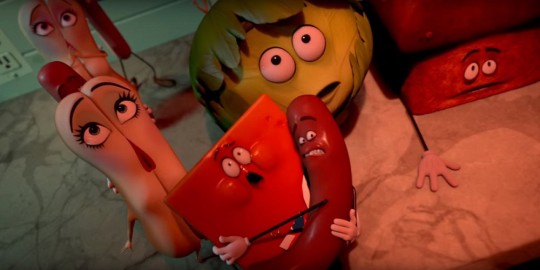
In film criticism, originality is often taken to be a cardinal virtue; we mark films down for adhering to weathered formulas or archetypes, and give credit for the ones that do things we haven’t seen before. When Sausage Party was released last year to rock-solid reviews, many were shocked, but really, they ought not have been that surprised - after all, it’s not often that we get to see what a truly original movie looks like.
On paper, Sausage Party seems transgressive without being all that groundbreaking; after all, we’ve seen crude animated movies for adult audiences before, from Fritz the Cat through to the works of Trey Parker and Matt Stone, but there’s something about the way Sausage Party was positioned that made it unique - sure, it was made for a mere $19 million, but this was that rare R-rated animated film that was ordained to compete in the big leagues, rather than breaking out from some underground niche. US-produced adult animations usually accept their status as esoteric oddities, embracing unfashionable visual styles and anti-mainstream sensibilities; Sausage Party rejects that, using modern tools and an aesthetic that credibly approximates the familiar look of its Disney/Pixar contemporaries to mark itself as a film designed to be seen and embraced by the biggest possible audience. Regardless of what you might think of the film itself, the manner of Sausage Party’s release was trailblazing - the first proper attempt by a studio in years to break American adult animation out of its enthusiasts-only ghetto and show that cartoons for older audiences can be appeal on the same level as a live-action movie of the same genre. That Sausage Party went on to gross of nearly $100 million in the US should be seen a massive win for the medium, and will hopefully embolden the industry to further experiment with the kinds of animated stories and visions they’re willing to bankroll in future.
Of course, this victory would feel tainted if Sausage Party had turned out to be exploitative trash, but watching the final film, even hardcore Sausage-sceptics would have to admit it’s a movie that embraces substantive ideas and commits to them, hard. Your mileage is likely to depend on how well you click with the sensibilities of Seth Rogen and Evan Goldberg (Superbad, This is the End, The Interview), who’ve made a career on exploring challenging concepts in unabashedly juvenile terms, because this movie represents the apotheosis of their operating model to date; taking the Pixar template of “what if X had feelings?” to its most lurid conclusion, Sausage Party is a deceptively literate spiritual odyssey that confronts sentient food items with the brutal reality of what they were created for, sending them spiralling into existential crisis and surreal voyages of self-actualisation. As a deconstruction and critique of religious thought, it’s intelligent in a number of ways, opting against abrasive confrontationalism in favour of a humanist, pluralist conclusion that encourages people to reject the limits that society places on them and be their authentic selves in a non-judgemental fashion; what’s just as impressive is the way it’s able to explore this essentially benign, moderate message in such relentlessly coarse, taboo-shattering terms, without feeling like it’s working at crossed purposes with itself. This is a film with legitimately interesting things to say about the evils of dogma, the need for respectful discourse, the importance of actualising your sexual identity and the destructiveness of identity-based conflict - and does so almost entirely through the medium of cartoon violence and dick jokes. All of this builds to a jaw-dropping third act of insanely violent, sexualised excess that’s honestly unlike anything I’ve ever seen in a mainstream movie - and yet somehow still feels reverent enough to the spirit of Toy Story that its credentials as a legitimate entry in the same animated adventure genre remain unbroken.
I’m ardent in my admiration for what Sausage Party represents, and I say that with full acceptance of its problems. Its gleeful indulgence of ethnic stereotyping, for example, doesn’t really pay off with a satirical point clever enough to justify it all, while the sheer crudeness of the film - the villain is literally an anthropomorphic douche - is likely to stop a lot of people from connecting. I also need to give acknowledgement to the widespread stories of mistreatment and exploitation of the animation team by production company Nitrogen Studios and co-director Greg Tiernan, which puts that thrifty $19 million budget in a different light; that can’t really be excused, but it also doesn’t invalidate the fact that the resulting film is a valuable, singular piece of pop art that’s worth much more than the sum of its parts. It’s up to you to decide whether knowing how the sausage was made is enough to put you off; all I’m saying is that it’s worth trying, because Sausage Party is both tastier and more nutritious than you might expect.
4. Trolls

One of the main reasons why 2016 ended up such a good year for animation is that, due to some strange quirk of scheduling, many of the major studios ended up releasing two films during the year. I’ve covered Illumination’s pair already, and I’ll be coming to Disney’s duo momentarily; for now, I want to give some much-needed kudos to the oft-criticised DreamWorks, who not only turned out a fine Kung Fu Panda sequel, but also somehow elevated a reboot of the Trolls toy franchise from cultural detritus into a genuinely joyous moviegoing experiences.
I expounded at length quite recently about the many virtues of Mike Mitchell and Walt Dohrn’s cuddly little movie, so I won’t add too much here, other than to say that my admiration for a film that still stands out as a surprise of the most pleasant variety hasn’t dimmed. There’s always a special kind of joy that comes with being blindsided by a great film that comes out of nowhere, and Trolls is the very definition of that: the concept sounded terrible, the early marketing was appalling, and yet the final film is confident, earnest, visually beguiling and bursting with an infectiously guileless goodwill that’s much harder to evoke in a sincere way than Trolls makes it look. Indeed, in a world where Sony Pictures Animation continues to struggle to strike the right tone with its various adaptations of the esteemed Smurfs franchise, DreamWorks deserves applause for nailing the right mix of sweetness and spice on the first attempt at what’s essentially the same concept. That’s not to say Trolls is wholly derivative, though; if the “happy forest friends” setup isn’t exactly groundbreaking, there’s ambition to its lightly-sketched philosophical exploration of the spiritual origins of happiness, while its sharp humour and aesthetic exuberance ensure it never forgets to make you feel the emotion it’s examining. If there’s one lingering disappointment, it’s that more people didn’t notice exactly how impressive this fluffy and genuinely uplifting jukebox musical turned out to be; with its theatrical run topping out at a solid but unspectacular $339.5 million worldwide, Trolls remains one of 2016’s better-kept secrets, a movie that seemed to pass most people by. That’s an unfortunate outcome for a film that I’m willing to list among the best animations of the year, but it does at least preserve its status as a surprise package waiting to be opened, shared and discovered by more people.
I hope, too, that DreamWorks take solace and pride in the quality of the work they put out in 2016. Both Kung Fu Panda 3 and Trolls both ended up as modest rather than overwhelming commercial successes, but there was a solidity and assuredness to both movies that the studio hasn’t always found easy to come by; these are qualities that will serve the company well as it prepares for life under the new ownership of Universal. Of course, DreamWorks will always be DreamWorks, and maybe inconsistency is baked into their DNA: the fact they’re following up such a strong 2016 with a 2017 slate consisting of The Boss Baby and Captain Underpants: The First Epic Movie seems like a testament to that. But hey, this time last year I was busy writing off Trolls, so what the hell do I know?
3. Moana
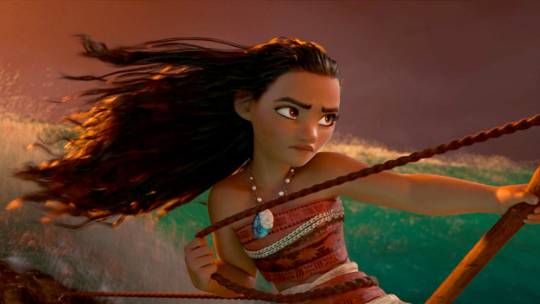
It’s weird for me to think about this, but most people born after about 1990 or so probably don’t actually remember a time when Disney were the undisputed kings of feature animation. Ever since Pixar released Toy Story in 1995, they’ve ceased to be the only game in town, and there were times during the mid-2000s when they looked to be drifting into irrelevance; since then, however, they’ve come roaring back, and I feel as though 2016 will be seen in years to come as a point where Walt Disney Animation Studios really reasserted their dominance, even more so than their historic success with Frozen in 2013. I’ve praised Illumination and DreamWorks for the impressive feat of releasing two good movies in the same year, but that pales in comparison to Disney, whose achievement in releasing two potential all-time classics within eight months is little short of a miracle.
Due to its choice of genre, Moana was probably seen as the safe option out of the two movies, but anyone who’s seen it will know that writing it off as just another Disney princess musical is doing the film a massively reductive disservice. Veteran directors Ron Clements and John Musker’s (The Little Mermaid, Aladdin, The Princess and the Frog) first CGI movie feels like a substantial and welcome reinvention not just of their filmmaking approach, but of the “princess movie” template in general. This is a formula that Disney have been committed to tinkering with since the 1990s Disney Renaissance era, but never to such a root-and-branch degree as Moana, which takes only the most essential components of the template - to paraphrase the script itself, the fact that its protagonist “is the daughter of a chief, wears a dress and has an animal sidekick” - and builds a rousingly individualistic seafaring action-adventure with a refreshing perspective. It’s not just the fact that Moana feels different from her predecessors, with her Polynesian origins and stockier build, it’s that she functions differently; unlike any other Disney princess, she’s a swashbuckling hero first and foremost, embarking on a world-saving quest through active choice, rather than stumbling into one as a byproduct of some mission of family duty. On that foundation, Musker and Clements build a film that consistently zags where other Disney movies zig. This is an action-adventure that’s basically without a true villain; where the male lead, the blustering demigod Maui, remains strictly a supporting player, with no hint of unnecessary romantic intrigue; where the main animal sidekick is a scraggly idiot rooster that actively hinders the quest, while the cute, marketable pig stays home.
Of course, different isn’t necessarily better, but it certainly feels like a value-added bonus when your film is already as good as Moana is. Technically, it’s one of Disney’s most accomplished efforts, with astounding water effects and a beautiful oceanic palette, and it benefits from the same sparky dialogue and buddy-comedy chemistry between its leads that’s become a Disney trademark. Musker and Clements seem to have made progress on overcoming the somewhat episodic feel of their previous movies, with more of a sense of coherent driving momentum pushing forward the story, and they’ve certainly come on leaps and bounds in terms of cultural authenticity since the days of, say, Aladdin, with the Pacific Island setting treated with great respect in aesthetic, spiritual and casting terms. Then, of course, there’s Lin-Manuel Miranda, Opetaia Foa’i and Mark Mancina’s compositionally intricate and effortlessly catchy soundtrack, which is probably the finest from Disney since The Lion King - and hell, even The Lion King didn’t have a glam rock David Bowie style parody sung by a giant kleptomaniac crab, so maybe Moana has even that one beaten. It’s not all perfect, though; much as I loved the film, it does have a few pacing problems; the story spends an unusually long time getting Moana to leave her home island of Motunui, only to occasionally feel becalmed once the journey actually gets underway. The open ocean is an evocative setting, but it can also get pretty repetitive, and there are points in Moana where you start to miss the broader ensemble cast and diverse backdrops that we might have gotten if not for all the lonely, endless blue.
None of that was enough to prevent Moana from becoming one of the best and biggest animated movies of the year - though you get the sense that some pundits were expecting a bit more commercially from Disney’s first big princess musical since Frozen. It’s true that Moana’s solid $575 million-and-counting worldwide total doesn’t bear comparison to Frozen’s record-setting $1.27 billion - but then, when you think about it, Moana didn’t really turn out to be all that comparable to Frozen anyway. It’s possible that Moana reinvented so much about what makes a princess movie that it no longer registered as being one in the eyes of the audience - or perhaps it was never really a princess movie in the first place, and scored its own success on its own terms. Princess or not, she is Moana, and that’s good enough for me.
2. Your Name (Kimi no Na wa)
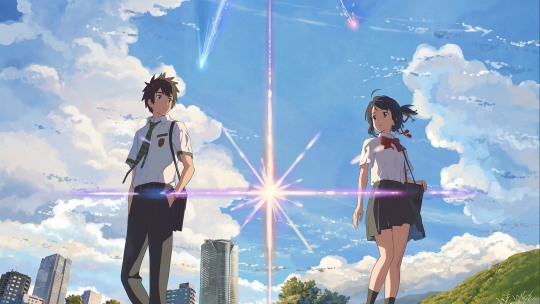
As I mentioned before, I have an unfortunate blind spot when it comes to anime, with my exposure to Japan’s prolific feature output basically limited to Studio Ghibli films and a small handful of others. That’s something I’d like to work on, so I jumped at the chance to see Makoto Shinkai’s blockbusting romance Your Name at the cinema last year as a way of putting that right; what I got was an outstanding and emotionally overwhelming reminder of everything I’ve been missing out on.
Your Name is a difficult movie to categorise - my best attempt would be “supernatural gender/body-swap tragicomedy-drama disaster romance epic”, but even that would be underselling the deft changeability and tonal fluidity of this marvellously-constructed movie, which came within a hair’s breadth of ranking as my favourite of the year. Part of that versatility comes from its mastery of the medium - I know it’s not intended to function as a primer on anime, but it couldn’t have done a better job if it tried, such is its command of everything that defines the format at its best. Here’s a 2D animated film that feels truly modern, that pushes hand-drawn animation to new levels of technical beauty and adventurous stylisation without feeling even slightly retro; here’s an animated film that can speak directly to a teenage and young adult audience, with a pop soundtrack and frank allusion to concepts of sexuality and gender identity, and evoke that lived experience of yearning adolescence in a way that feels sophisticated and universal; here’s an animated film that knows how to bring metaphysical mystery, power and spirituality to its narrative with a light touch, leaving just enough traces of magic to lend an edge of unknowable enormity to the intimate character story we’re being told. These are areas in which the best anime movies uniquely excel, and Shinkai seems to understand implicitly how to leverage these strengths without any of the weaknesses.
But Your Name isn’t designed to be appreciated on a beard-stroking conceptual level; for all its artistic accomplishment, it’s a weepy teenage romance at heart, and you couldn’t ask for one better. Its protagonists - small town girl Mitsuha and Tokyo boy Taki, who mysteriously find themselves intermittently swapping bodies - are enormously likeable leads with whom it’s easy to empathise, whether it’s Mitsuha’s longing to experience life beyond her idyllic but fishbowl-like rural community, or Taki’s increasingly passionate desire to connect directly with the girl who’s literally changing his life from the inside. The latter quest comes to form the driving emotional engine of the film, and writer-director Shinkai does a fine job of creating a palpable closeness between the two characters, whilst at the same time putting them in a situation where every conceivable obstacle - time, space, fate - stand in the way of them ever meeting. If that sounds melodramatic, that’s because it is, but Your Name knows exactly how to sell a brand of epic romance that makes the audience feel like they’re seeing something much more profound than the feelings of two people; that’s partly a function of the gorgeous hyperreality of the visuals, but also a testament to the way Shinkai unfolds the story, expanding what starts out as a light, sweet body-swap fantasy into something larger and more mythic. To say more about how Your Name pivots and pirouettes through different plot ideas and genres would give too much away about a film that benefits greatly from being unpacked at its own pace, so I won’t go further, other than to say it builds to something that’s sweeping, exhilarating and wistful in all the right ways.
If it sounds like I’m giving this movie the hard sell, that’s very much intentional - certainly, Your Name doesn’t need any more of a push in Asia, where it’s been a record-breaking success, but Western audiences seem to be much less aware of it, as evidenced by its surprise omission from this year’s Best Animated Feature Oscar nominees. This may be partly because because the film isn’t actually due to be released in US theatres until April 7th 2017, a stunningly long delay that nevertheless gives me an opportunity to urge any American readers to make sure they catch it on the biggest possible screen. After all, Your Name helped to show me everything I’m missing by not watching enough good anime; the least I can do to return the favour is to make sure nobody misses this one.
1. Zootopia

Nobody who’s followed this blog for any length of time will be shocked by this choice; in fact, nobody who saw the Oscars or pays any attention to the film industry in general will be too surprised, as Disney’s Zootopia has proven a commercial phenomenon, a darling among reviewers and an awards magnet. Inevitably, this means the film has started to attract a few contrarian potshots, but I’m not interested in engaging with that; after all if we can’t take a moment to earnestly celebrate one of the best and bravest films Disney have made in decades, then why do we even watch movies?
I’ve spent a lot of words talking about Zootopia over the last 12 months, and yet it still doesn’t feel like it’s left my system; with its incredible visual design, instantly lovable character chemistry, deft pacing and bubbling comedic energy, it encapsulates pretty much every one of Disney’s traditional strengths, while also excelling in areas where the studio have never traditionally dared to tread. As a piece of worldbuilding, its thoroughness exceeds many science-fiction films - the breathtaking wonder of the first train ride into the city of Zootopia is a Disney moment for the ages, rendered with such immersive intimacy that I’d love to see it retrofitted as a VR experience - while the film’s vaulting thematic ambitions and willingness to delve into challenging social commentary feel like a seismic sea change for a company with a reputation for corporatised artistic conservatism. That I rate Zootopia as the best animated film of an incredibly strong year doesn’t preclude acknowledgement of its imperfections - the police procedural elements are a little oversimplified, it can be episodic at times, the metaphors can sometimes be heavy-handed - but it’s the intelligent, open-hearted generosity of the thematic dialogue it opens up with its audience that makes those concerns feel small. This is a pointed, satirical and often overtly politicised piece of work, addressing deeply divisive issues of prejudice, system bias, internalised privilege and societal identity, and yet it manages to do so in a way that feels pluralistic, universally empowering and non-judgemental - a feat that most adult-oriented media struggles to achieve. It’s a film that educates without lecturing, that shows asks you to find your own answers rather than spoonfeeding you solutions, that shines a light on the problems that society faces but still lets you walk out feeling energised, rather than depressed. That’s difficult for any movie to achieve; for Disney, with almost no experience of making topical satire, to be able to pull this off while still ticking all the boxes of a superlative, adorable and hilarious family adventure is one of the greatest accomplishments in their entire 80-year history of feature animation.
Honestly, if I have any lingering feeling of disappointment about Zootopia, it’s the question of why the message it expressed so eloquently didn’t end up making a bigger impression on those who saw it. That a movie with such an explicitly educational theme of cultural unification and overcoming differences was able to gross more than $1 billion in a year as riven by political division and opprobrium as 2016 is a testament to cinema’s value as a means of escape; unfortunately, it also probably tells us a lot about the cognitive dissonance that prevents people from actually living up to the virtues expressed by the media they enjoy. I started the year wondering whether Zootopia would be as good a movie as we deserve from Disney in 2016; I ended it wondering whether 2016 deserved Zootopia. Nevertheless, I’ll try to hold on the virtues the film embodied, and take heart from the fact that children raised with this heartfelt, articulate and deeply empathetic movie stand a much better chance of learning the right lessons from it than the rest of us did. After all, if a naive rabbit and a jaded fox can learn to overcome prejudice, see things from other perspectives and make the world a better place, maybe there’s hope for the rest of us mammals as well.

#Zootopia#zootropolis#your name#kimi no na wa#moana#trolls#dreamworks trolls#sausage party#sing movie#kung fu panda#storks#Finding Dory#kubo and the two strings#the secret life of pets#The Angry Birds Movie#best of 2016#oscar#academy awards#Disney#film analysis
8 notes
·
View notes